Lecture_2_7 DEVELOPMENT OF ENGLISH VOCABULARY FROM the 12

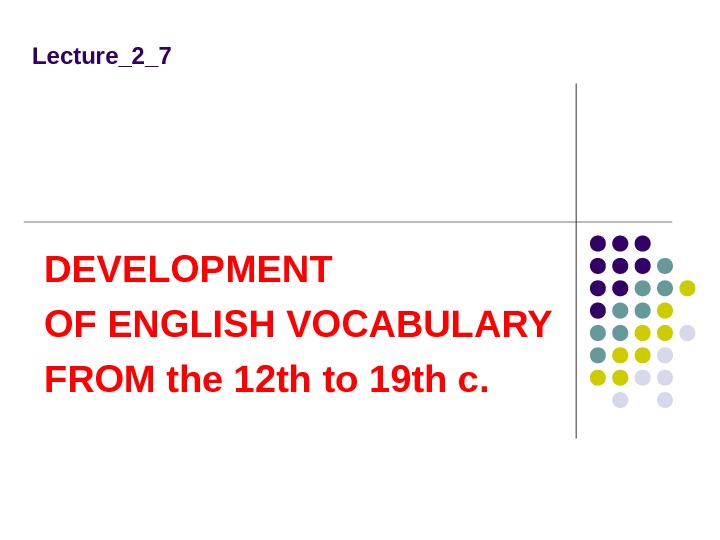
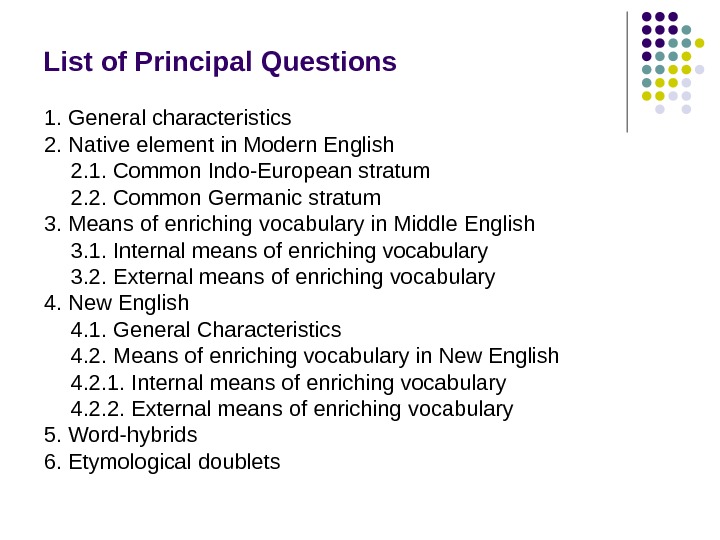
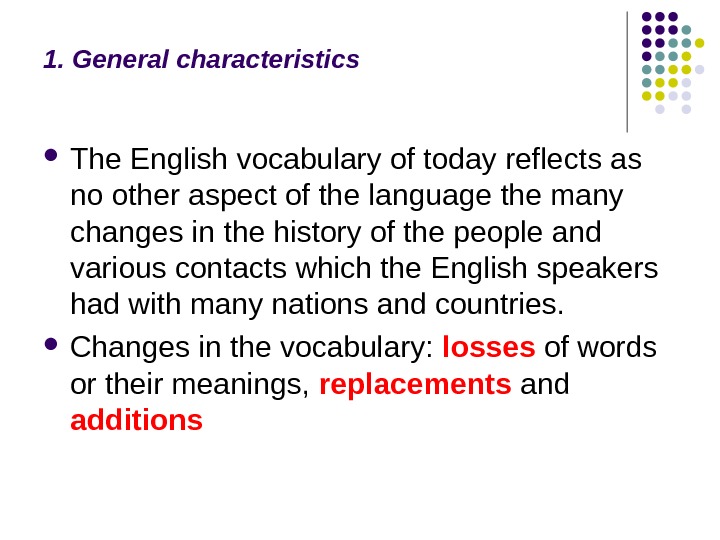
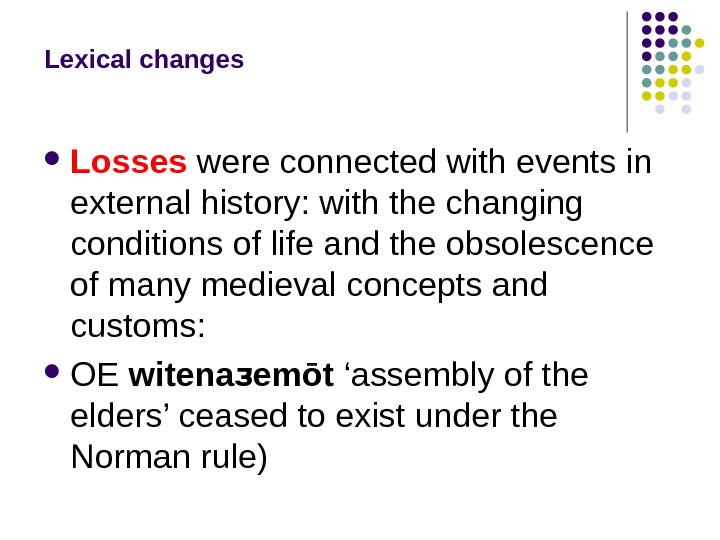
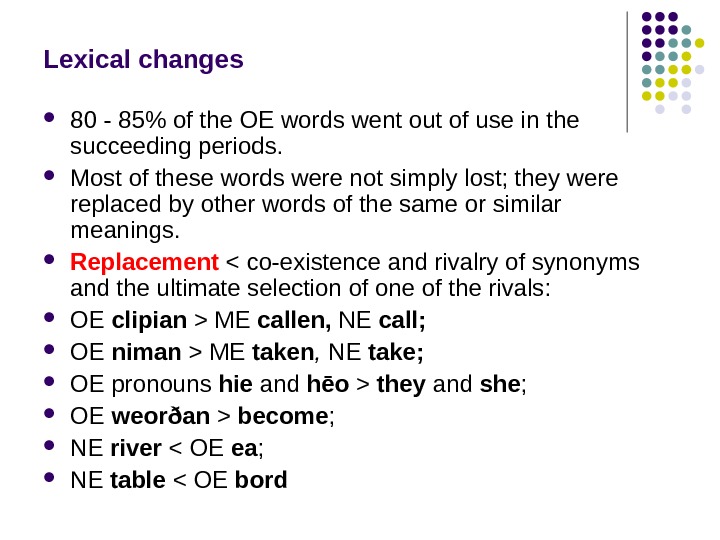
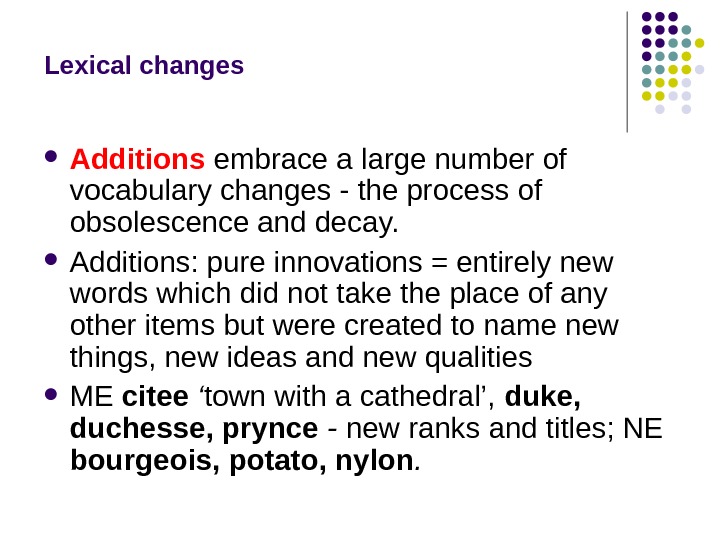
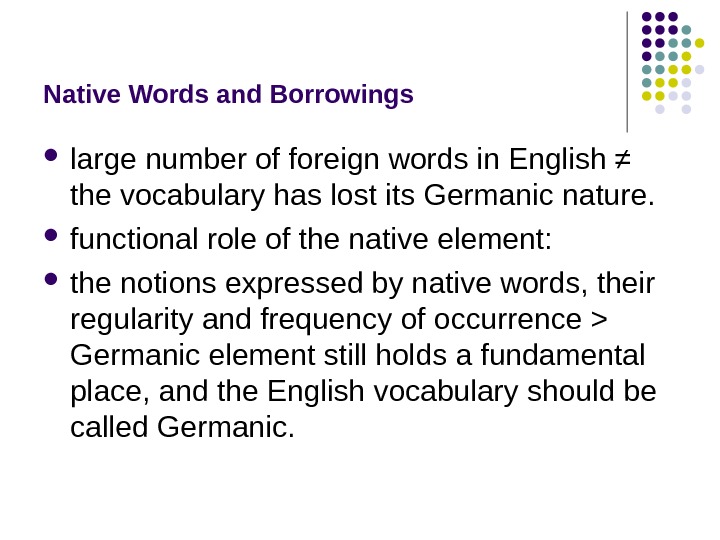
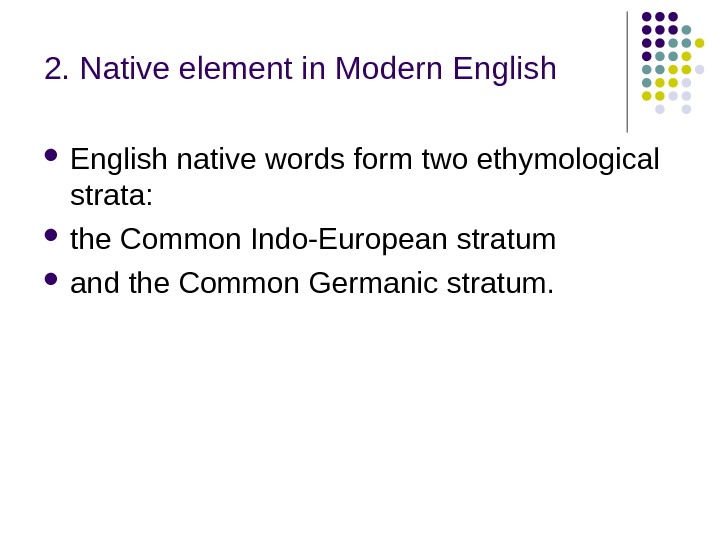
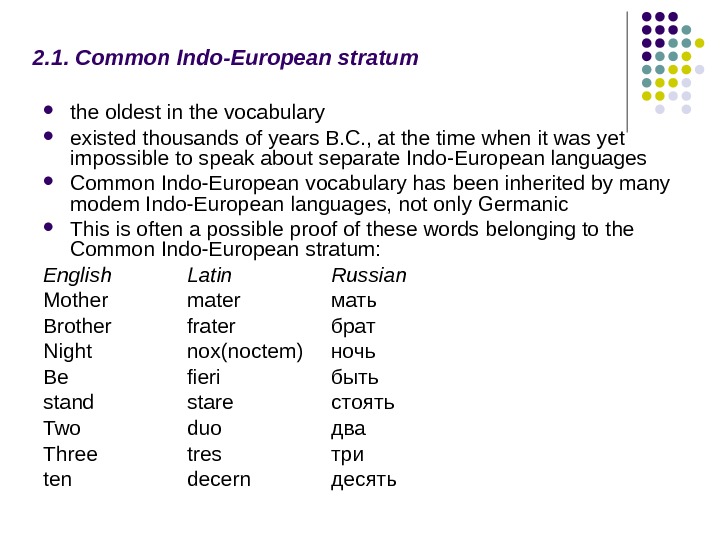
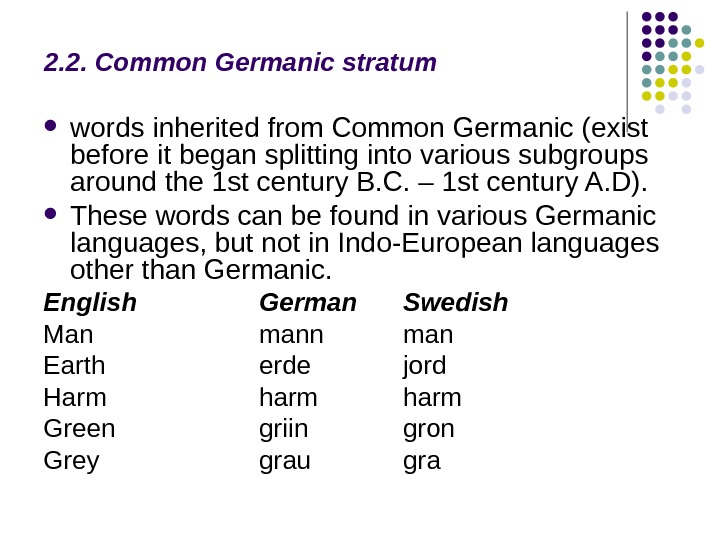
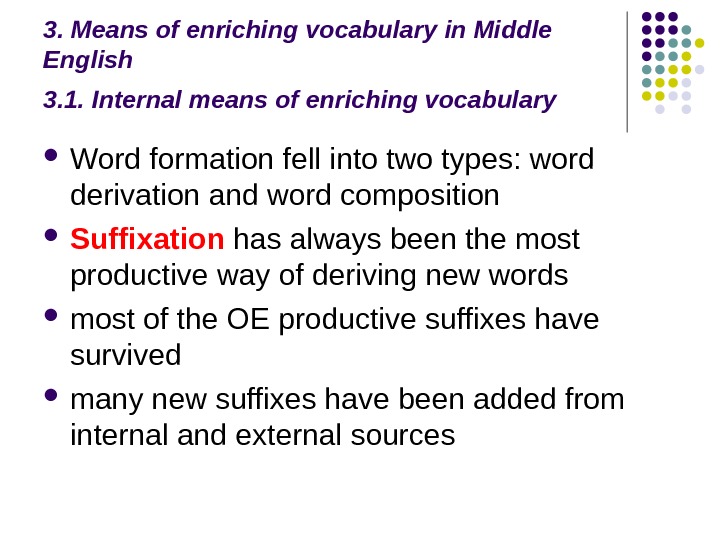
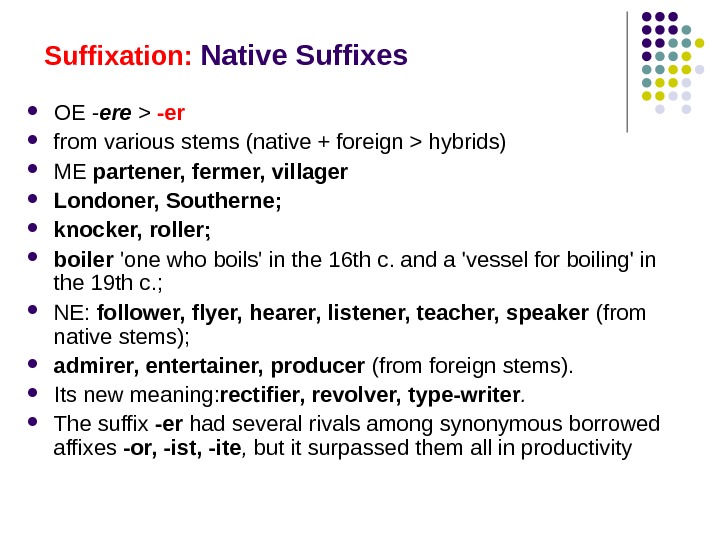
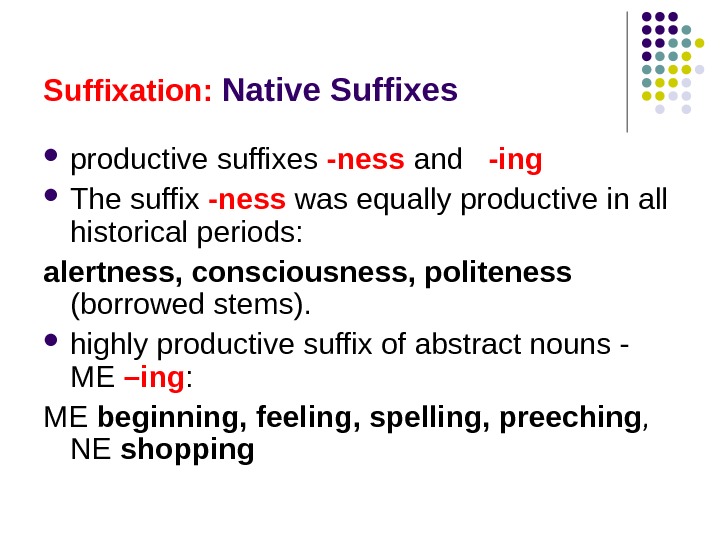
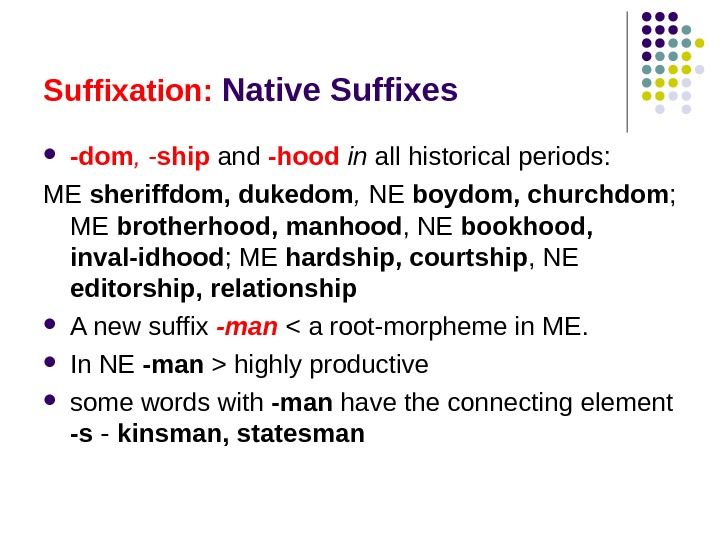
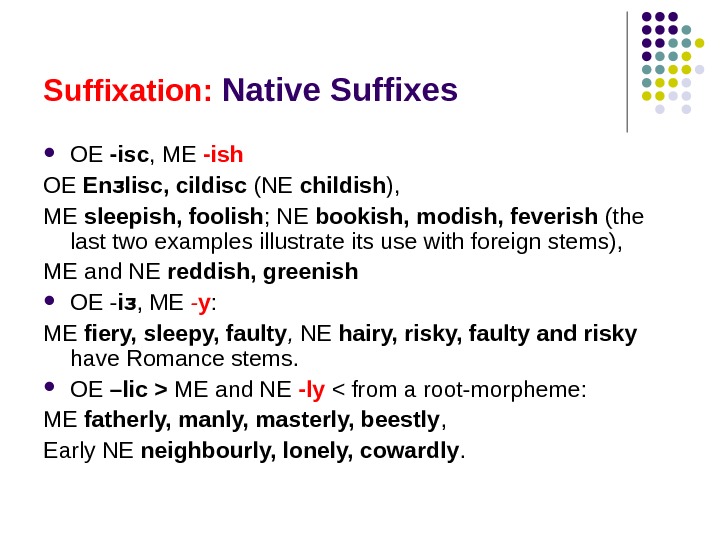
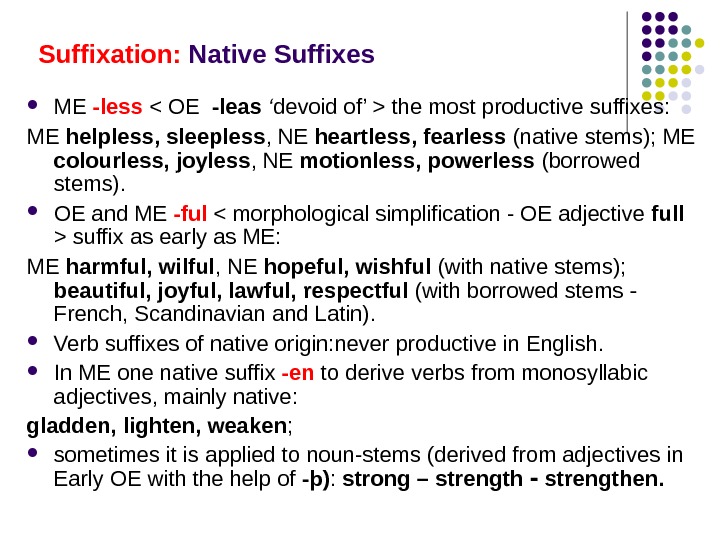
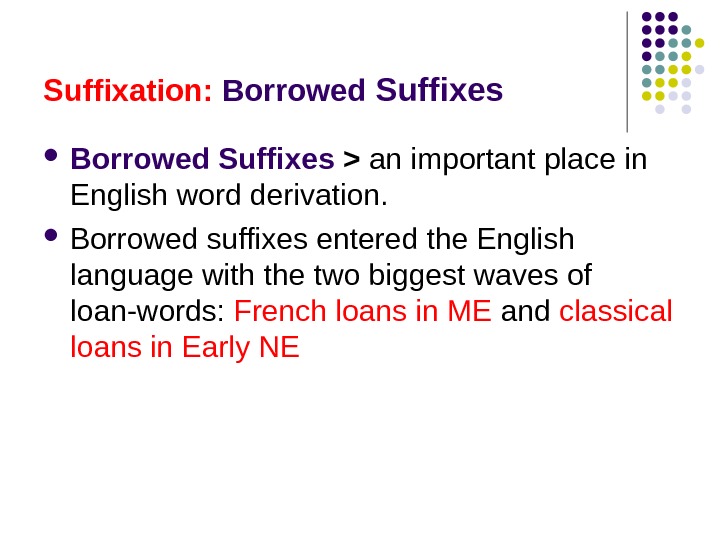
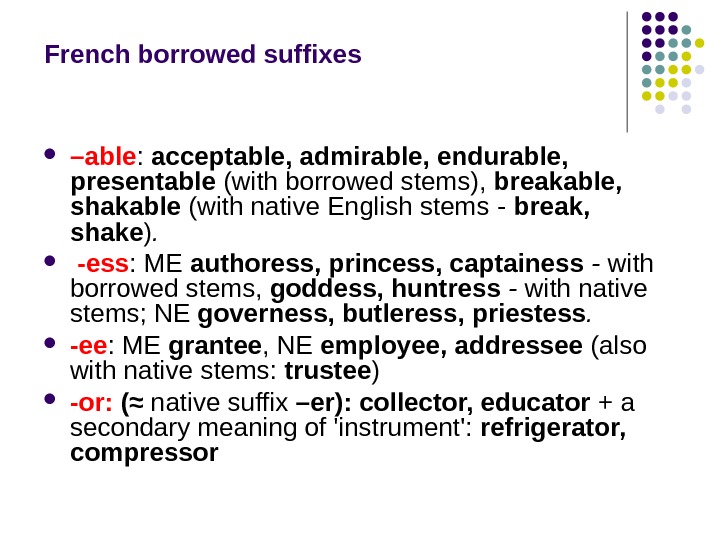
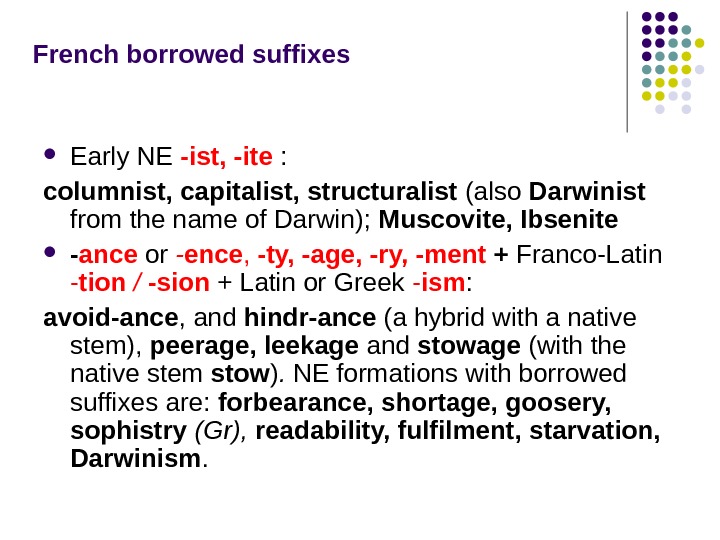
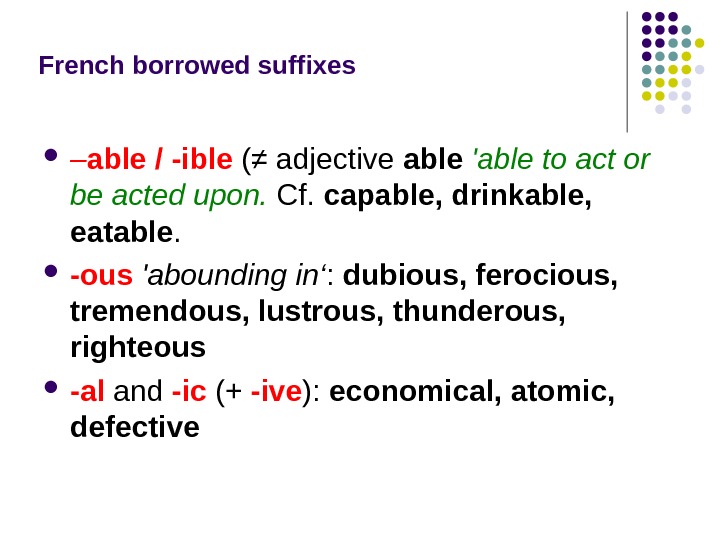
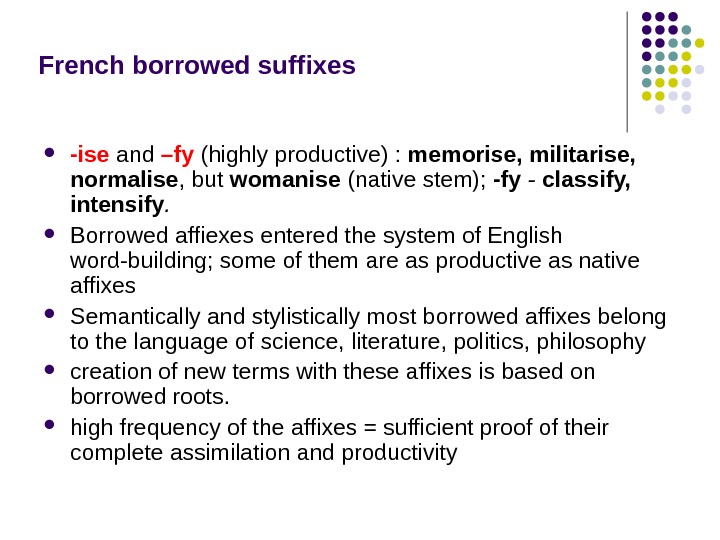
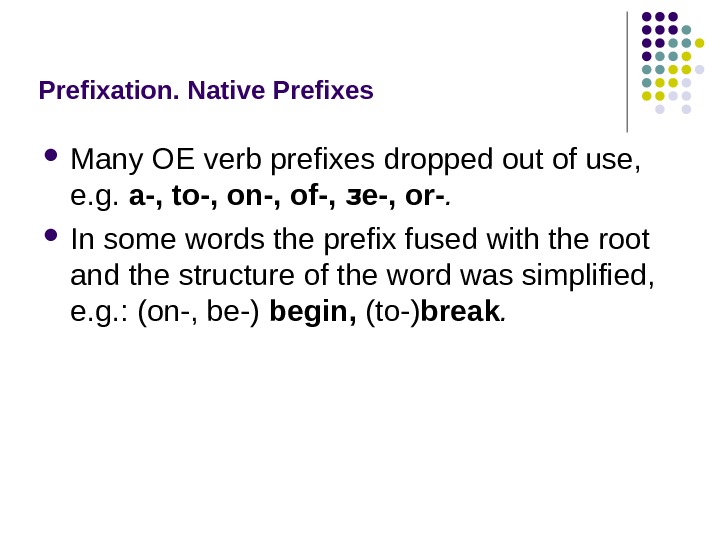
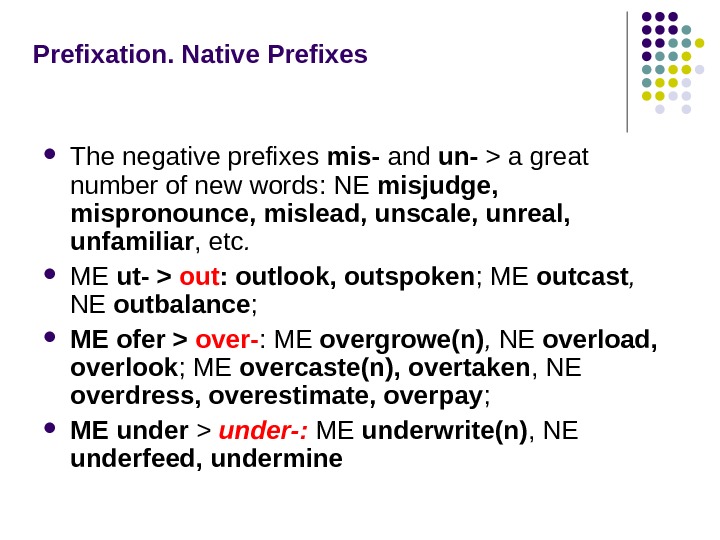
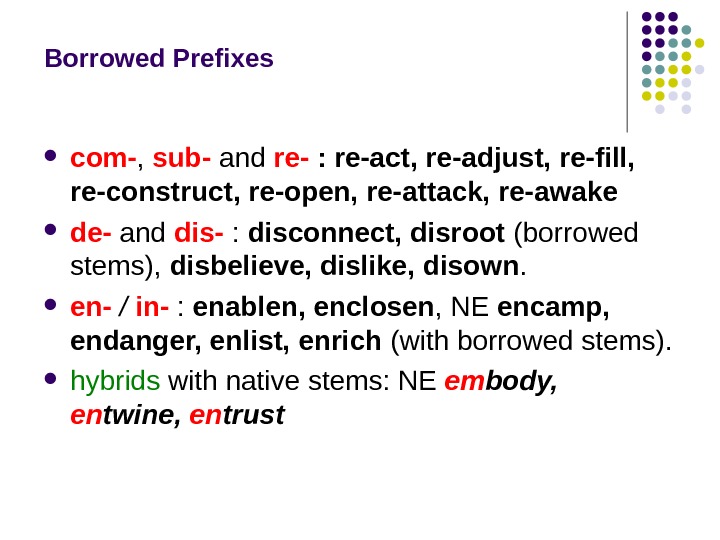
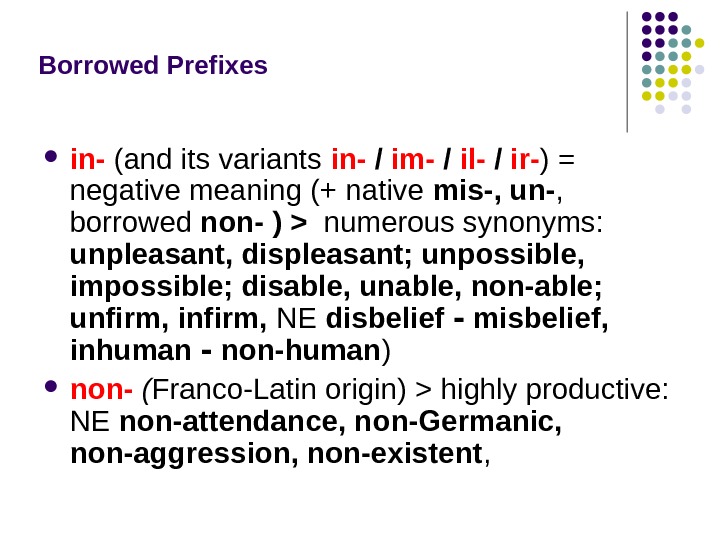
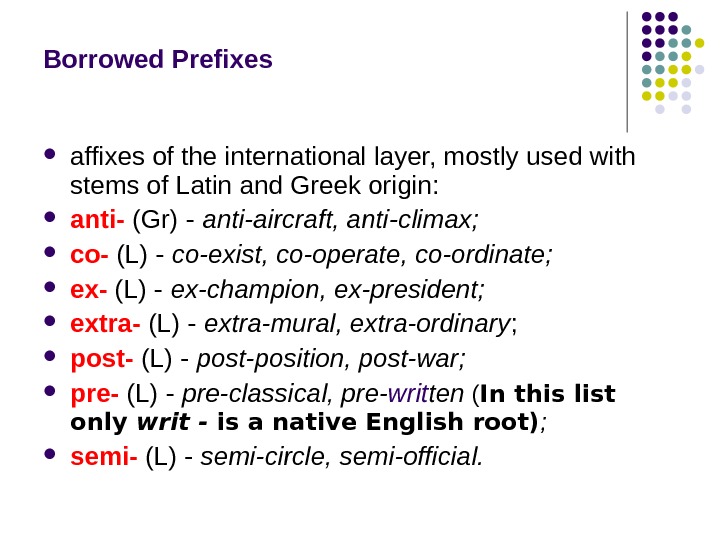
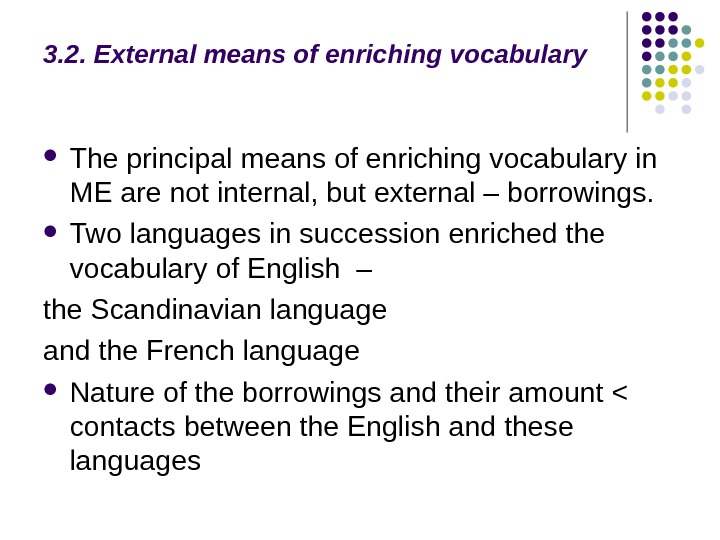
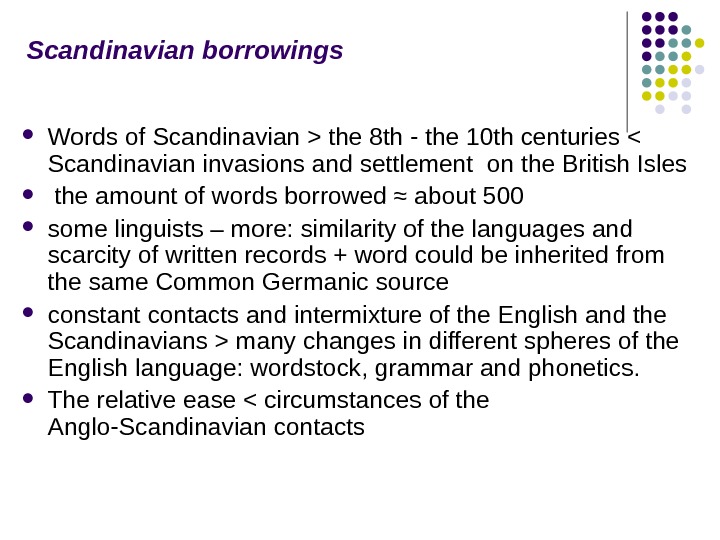
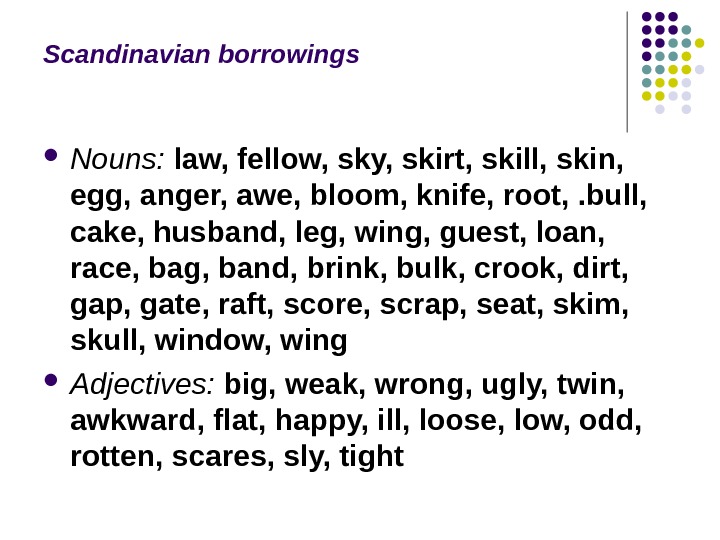
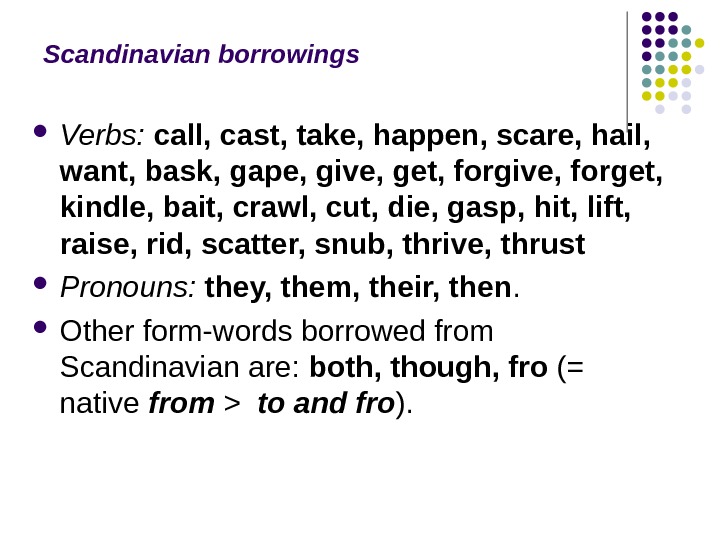
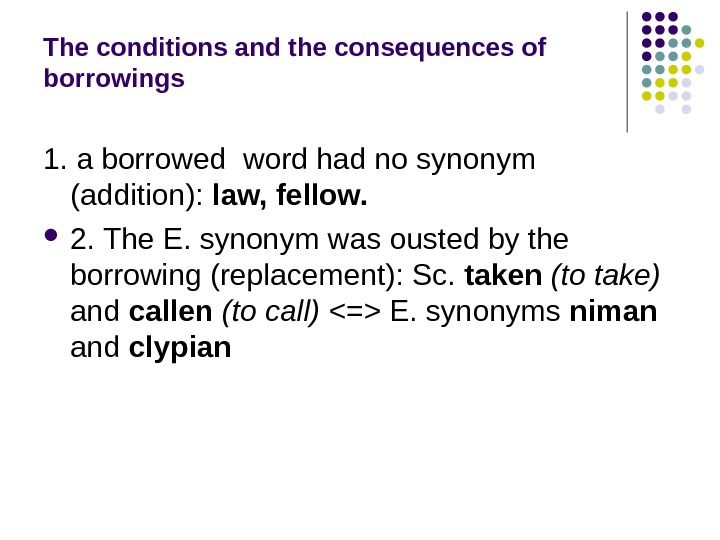
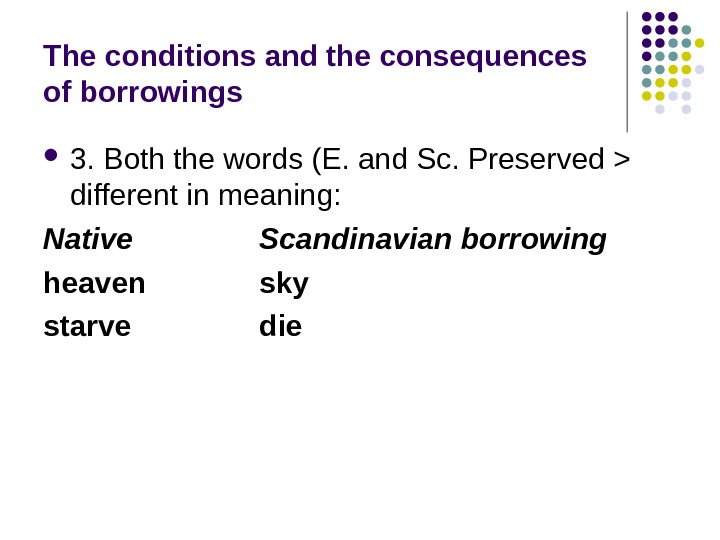
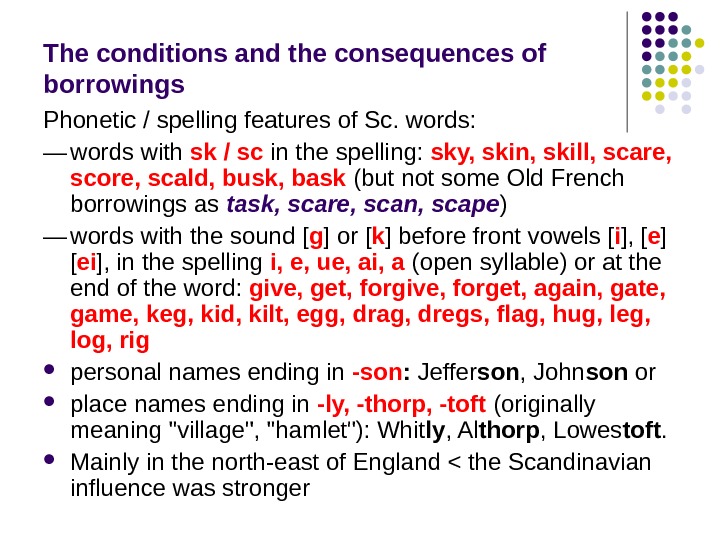
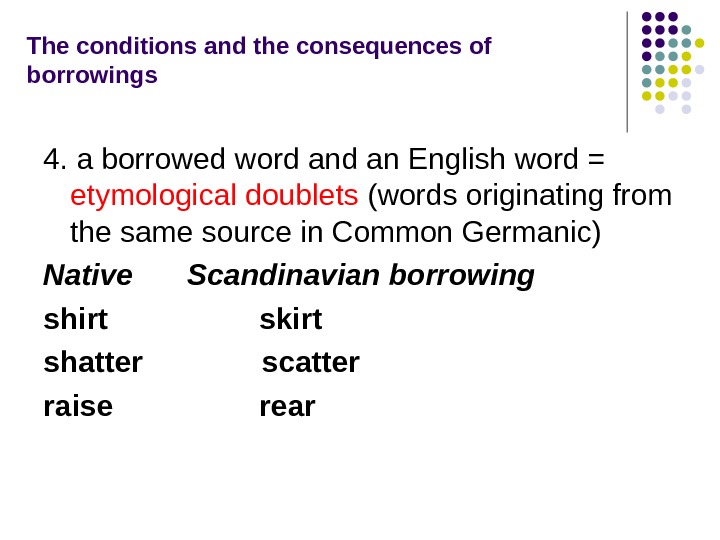
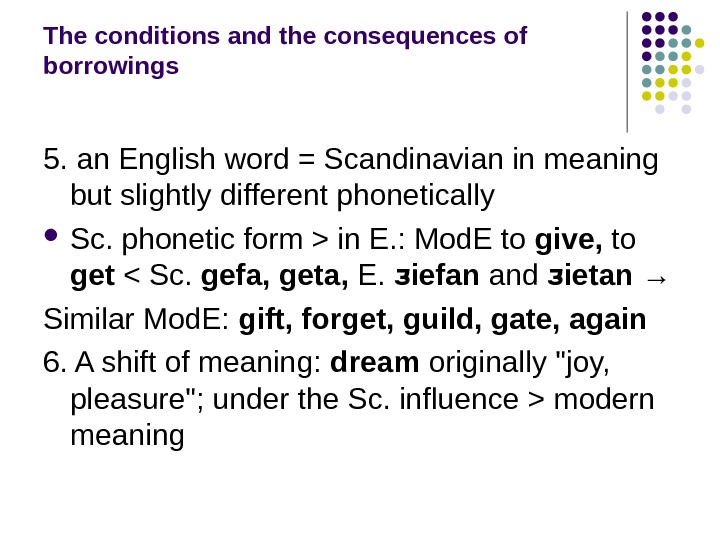
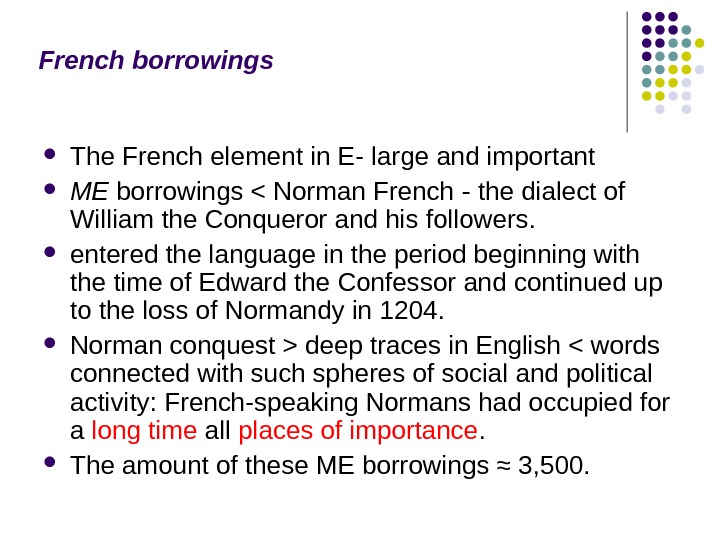
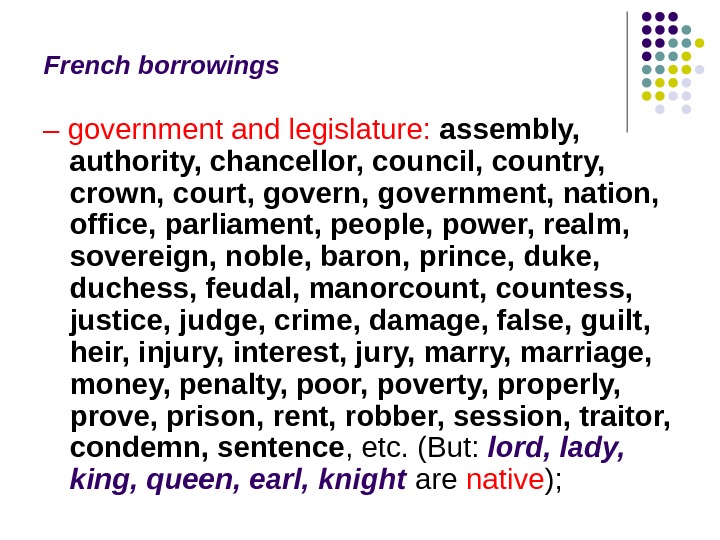
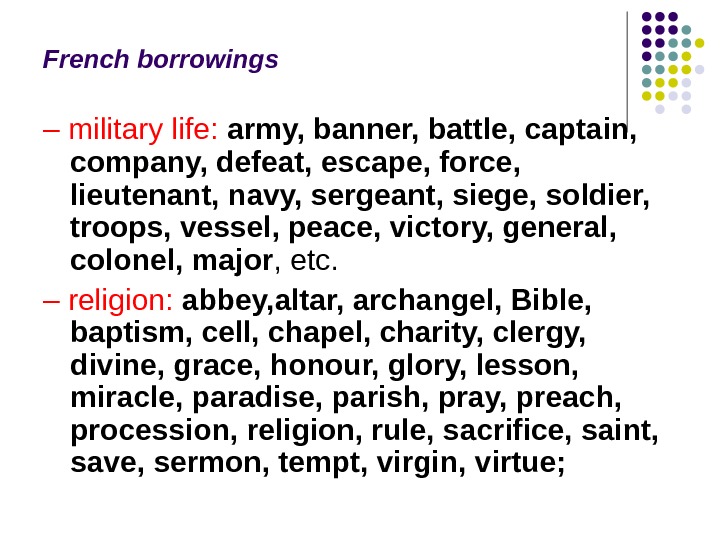
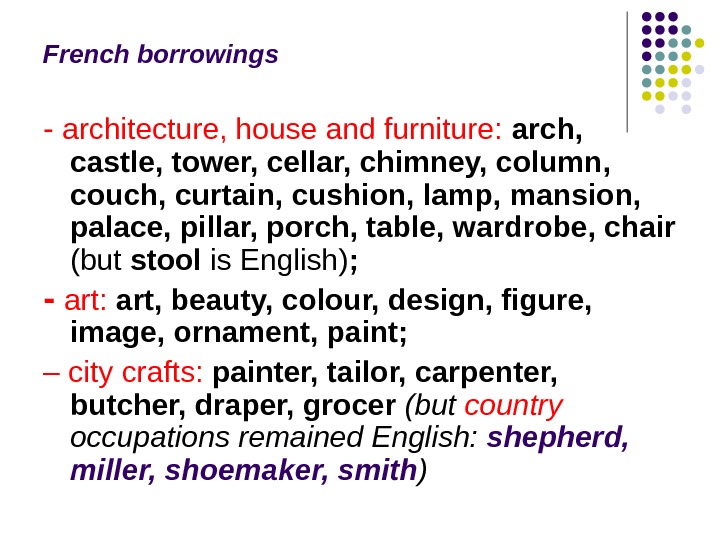
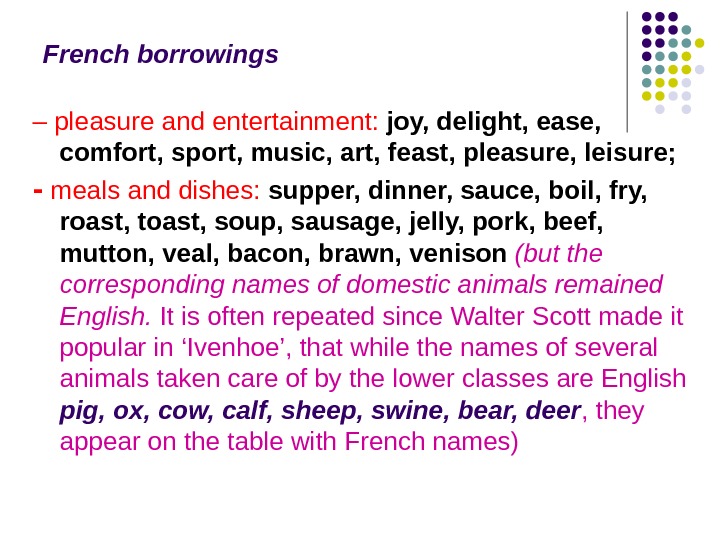
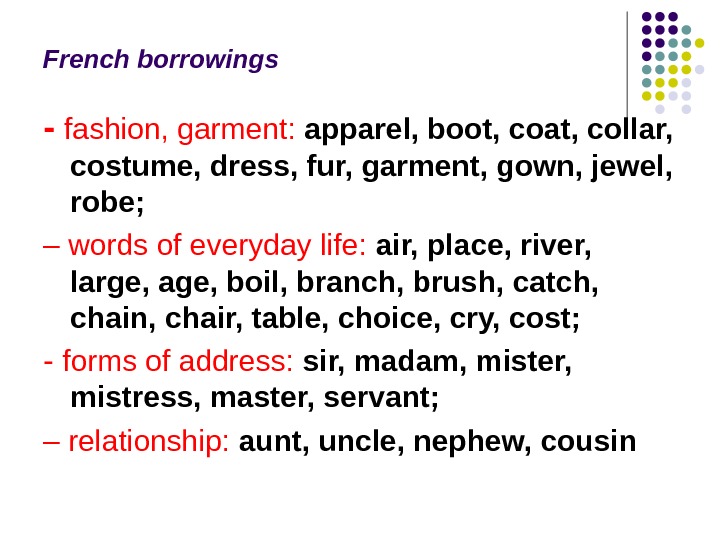
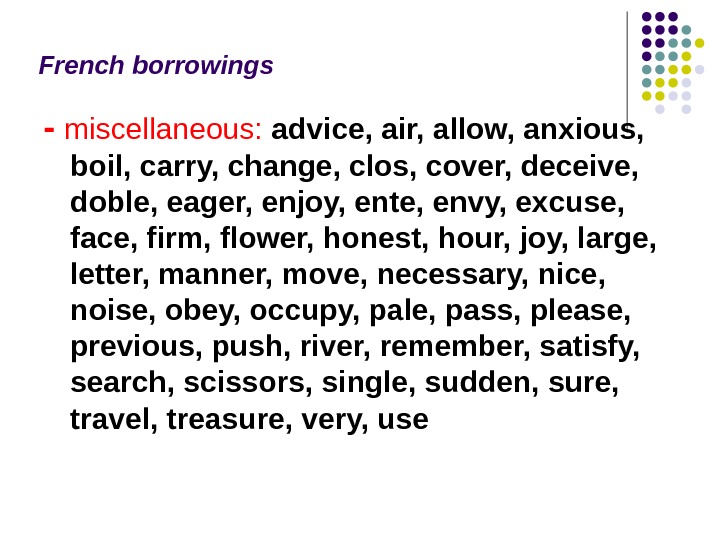
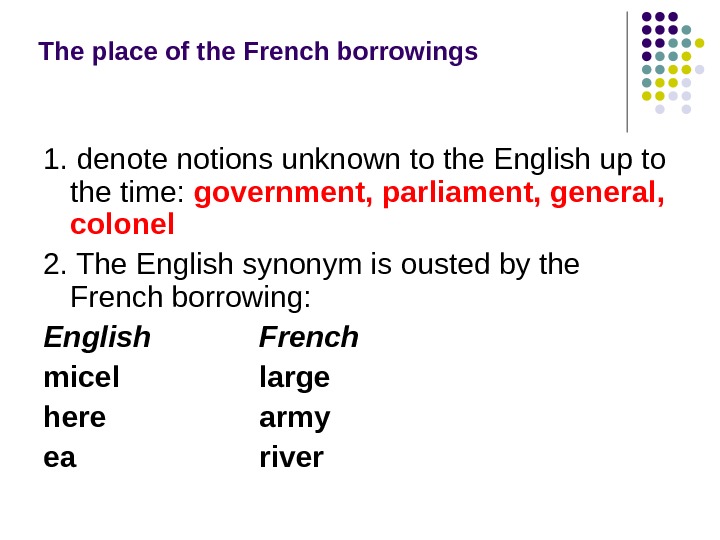
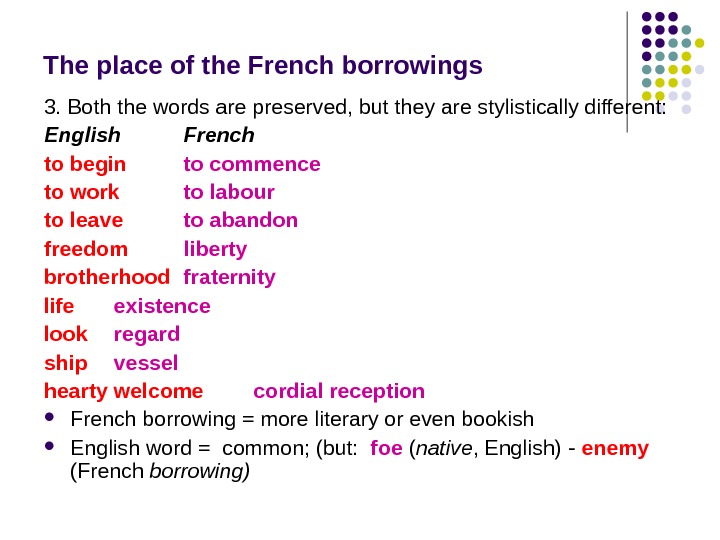
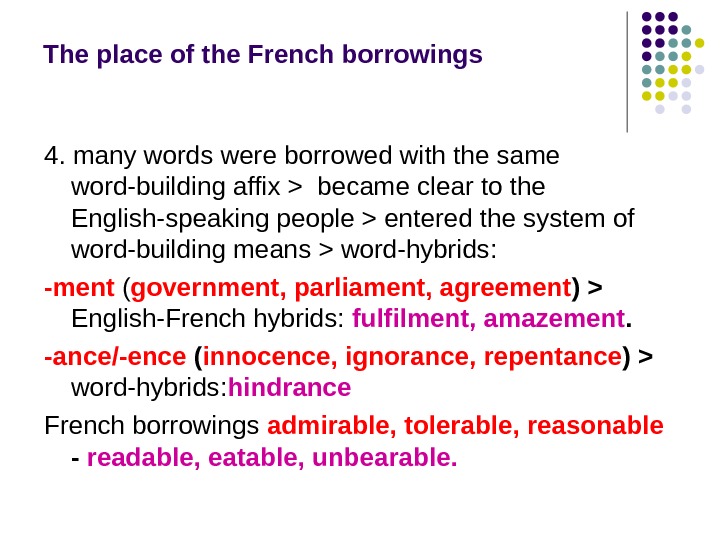
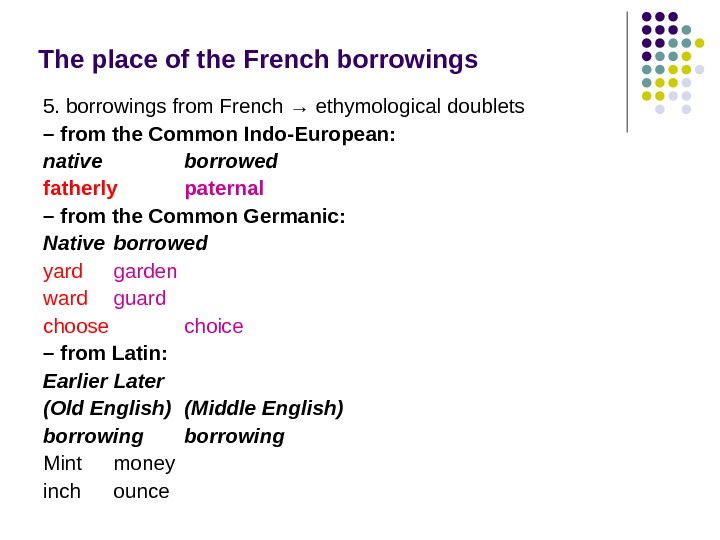
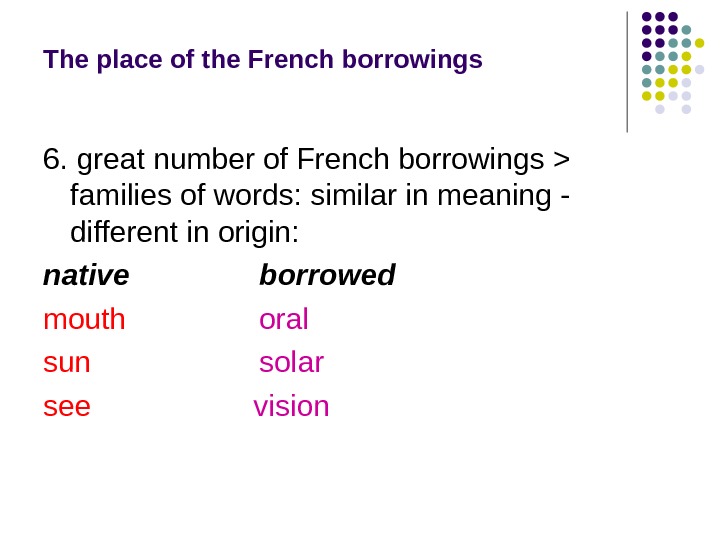
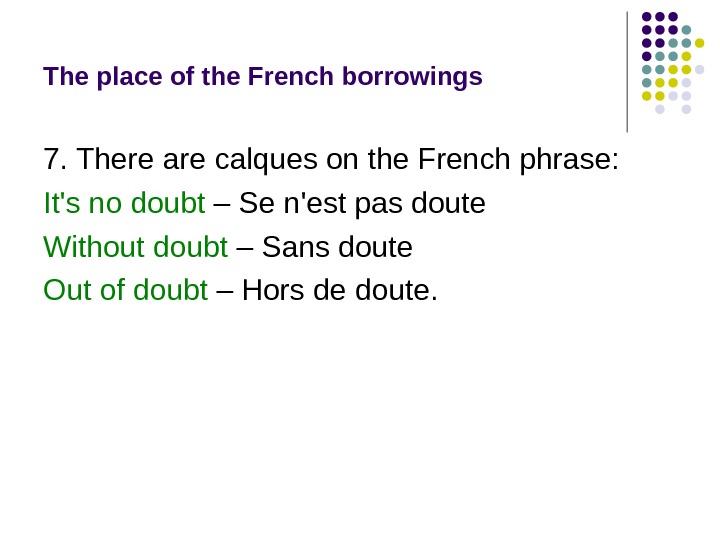
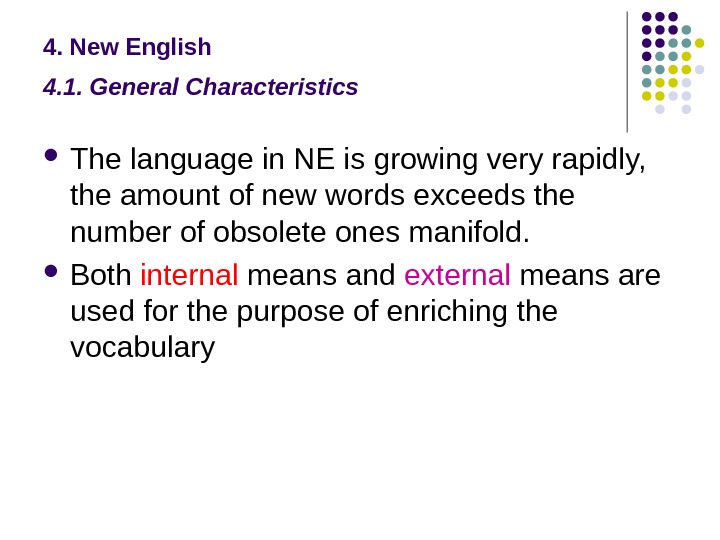
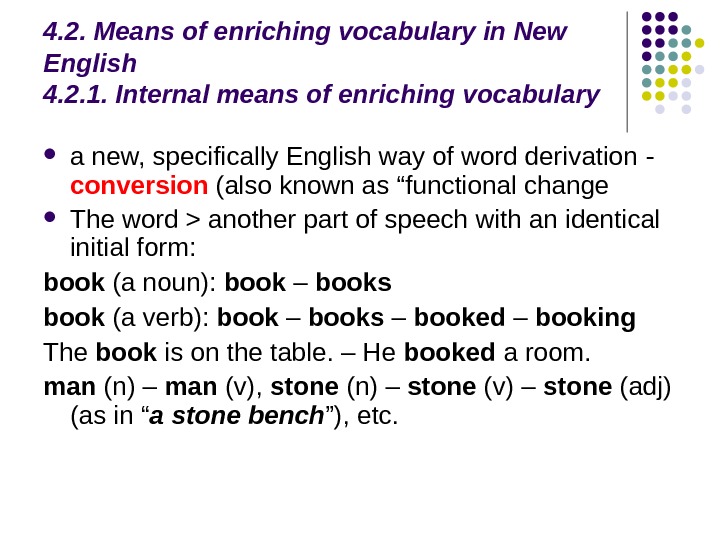
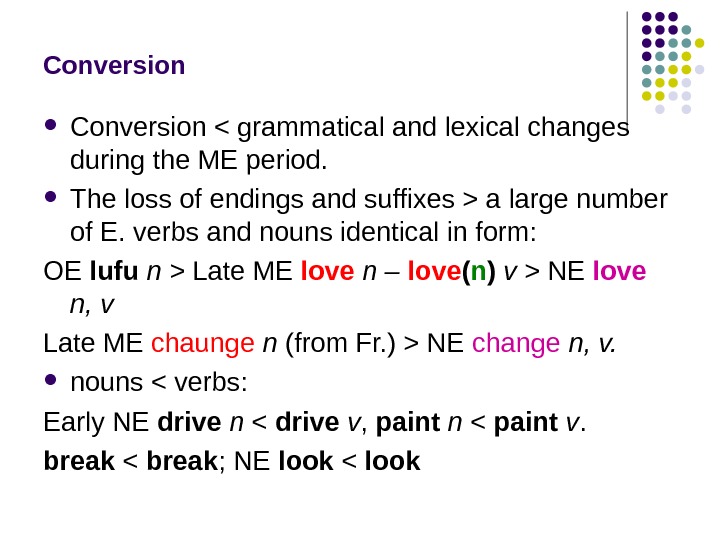
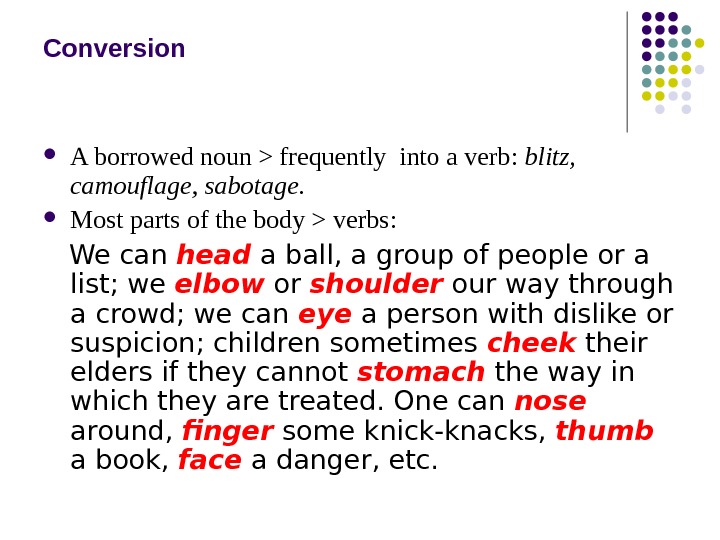
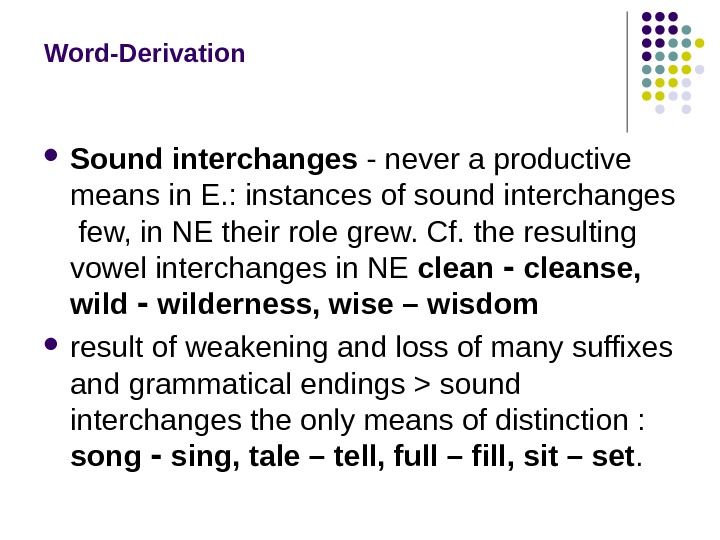

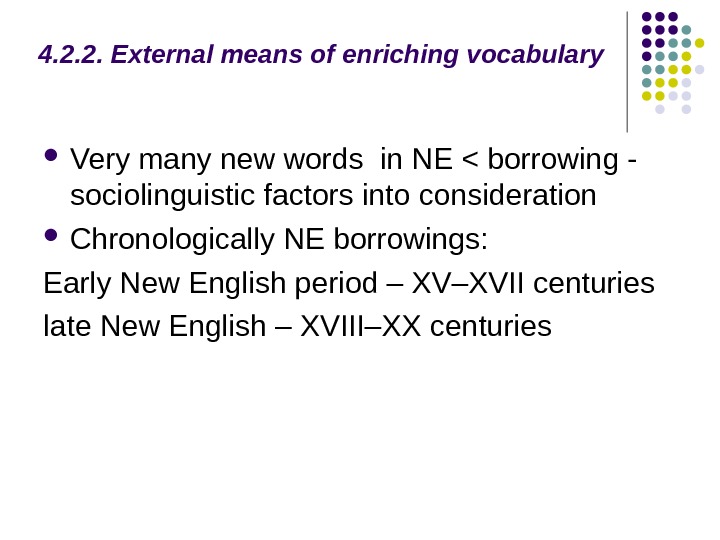
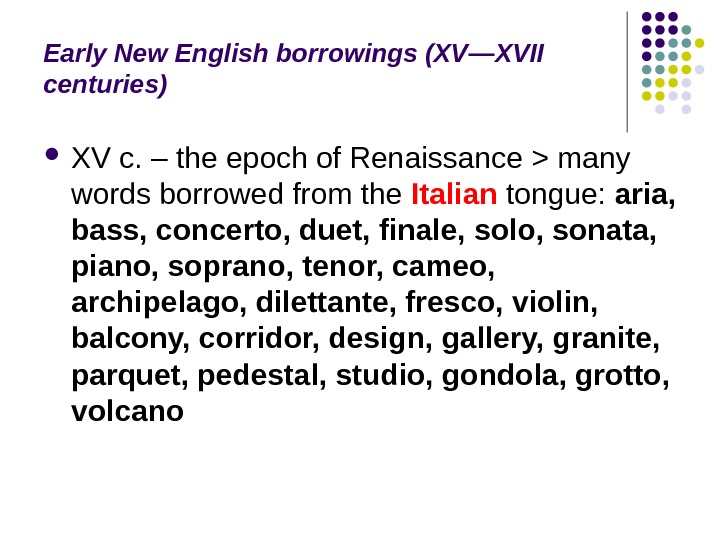
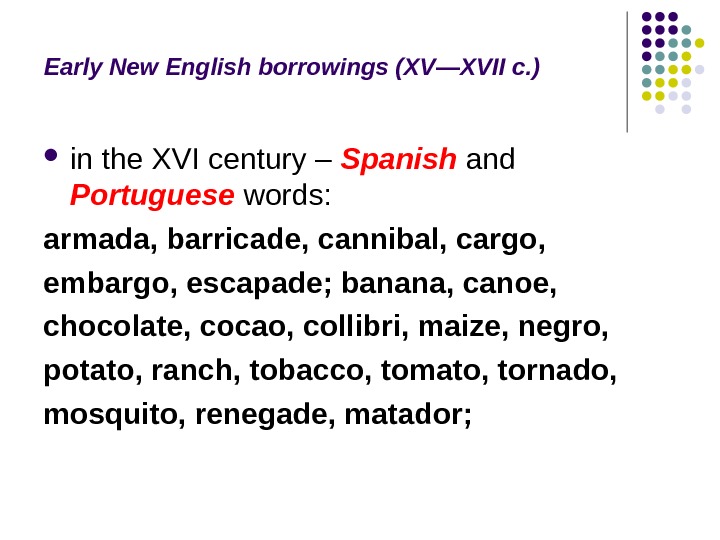
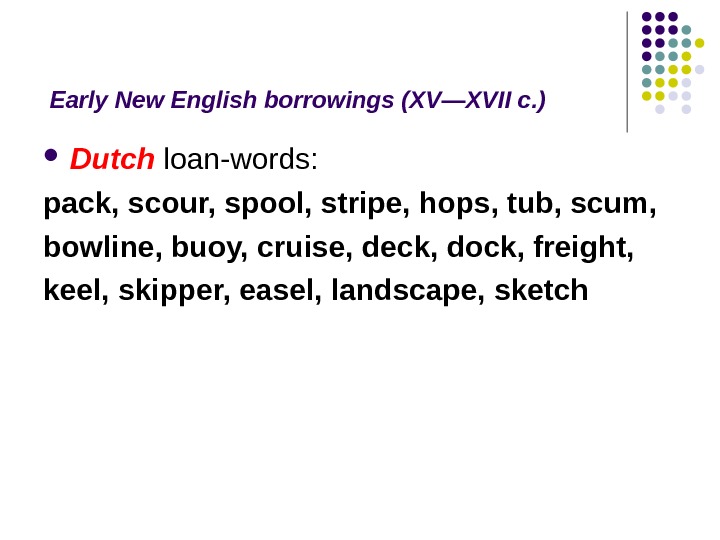
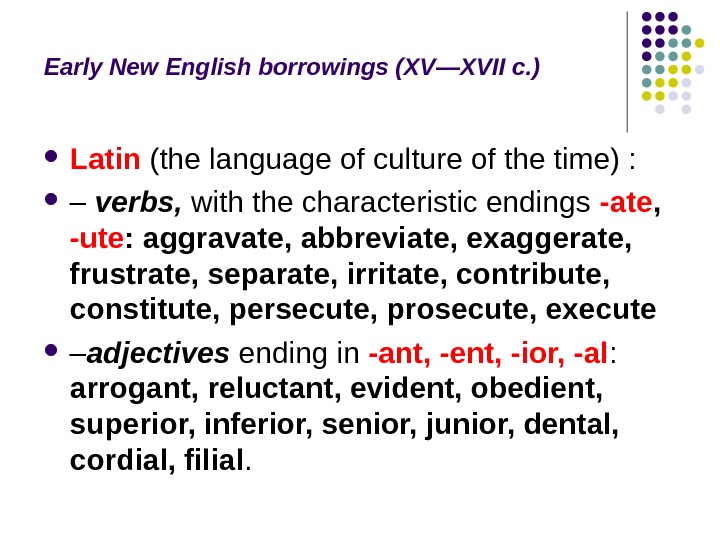
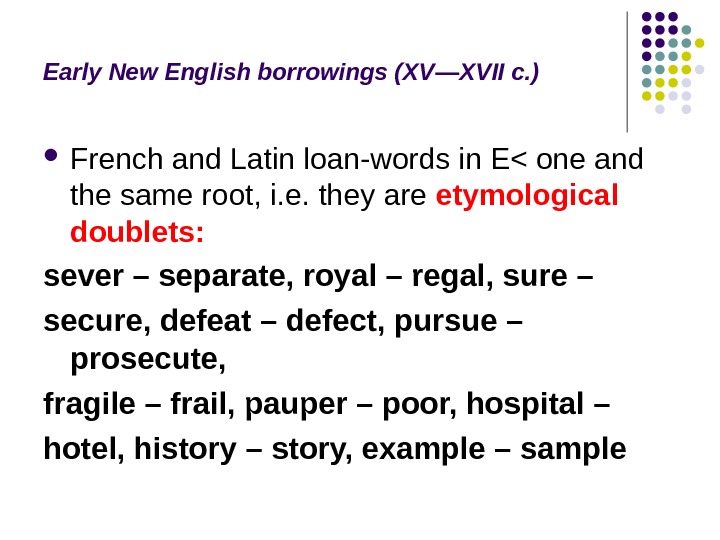
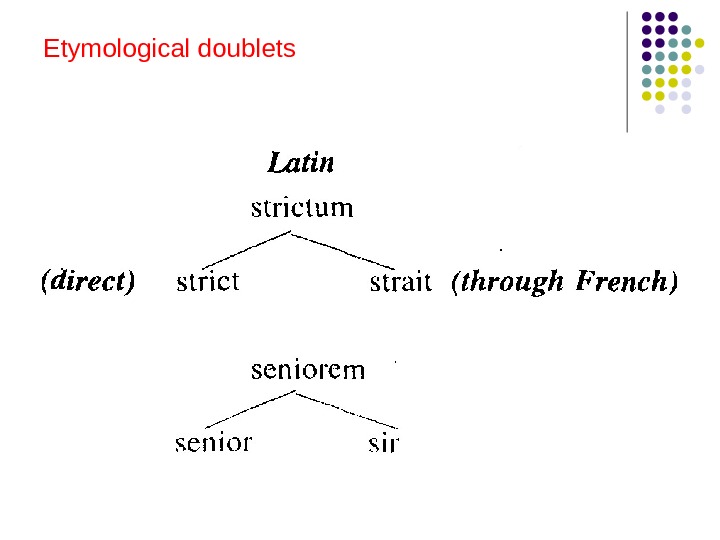
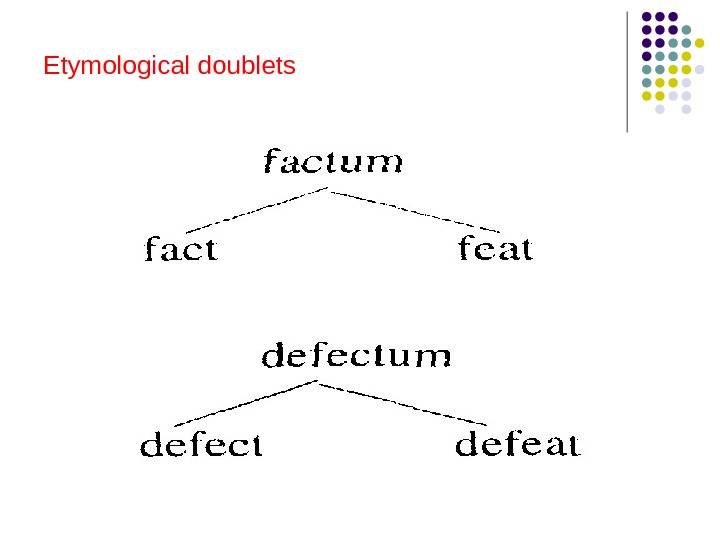
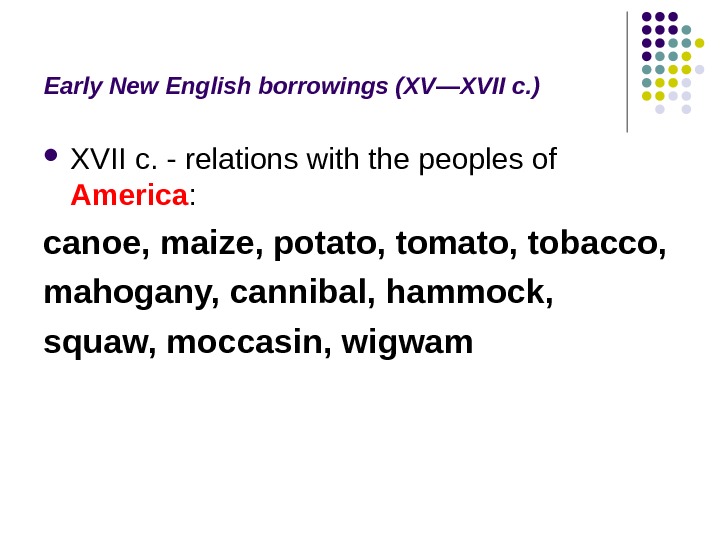
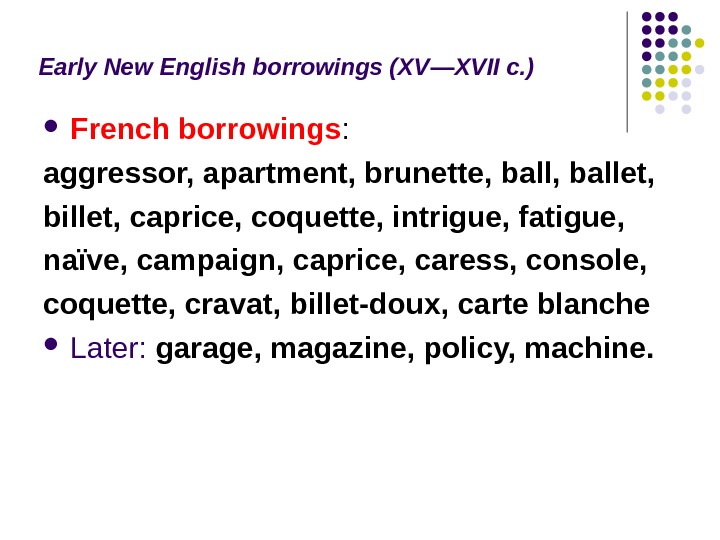
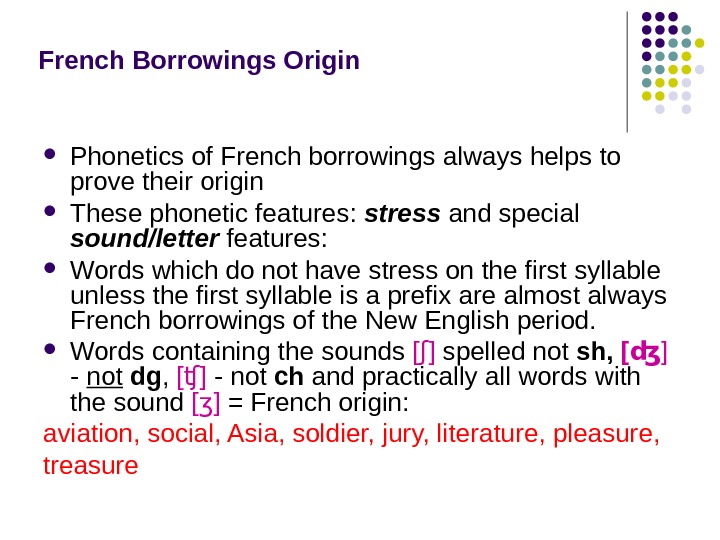
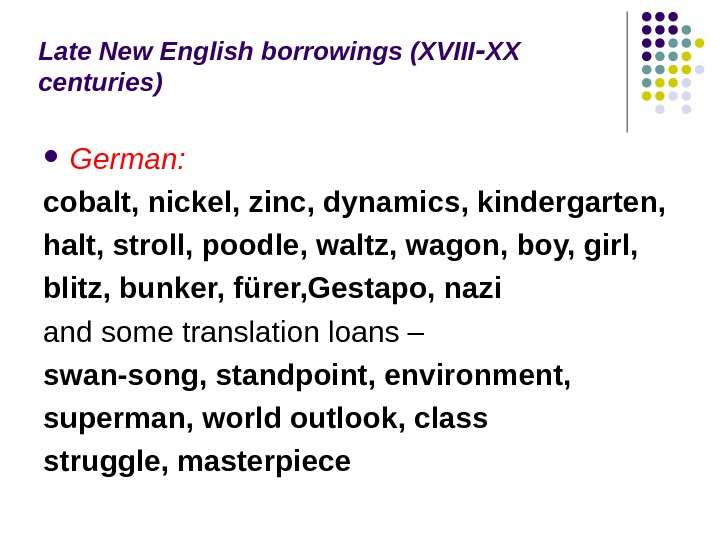
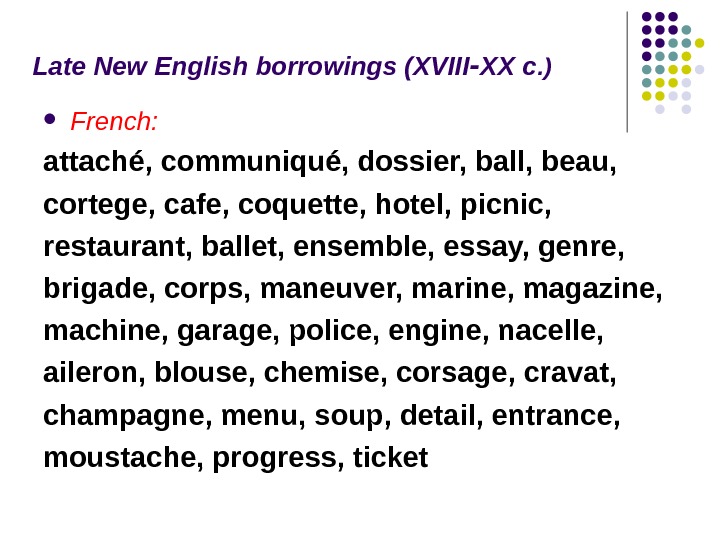
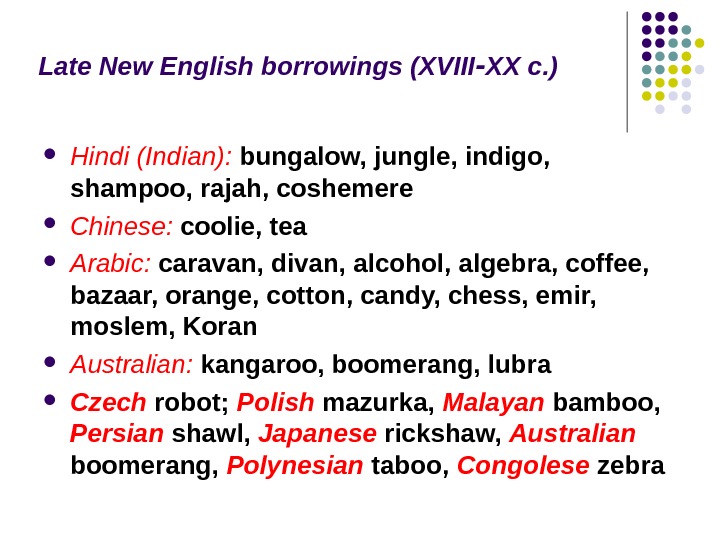

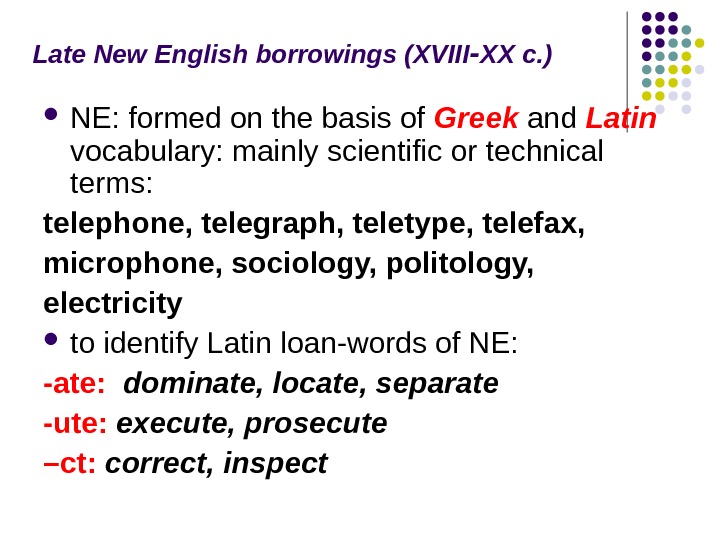
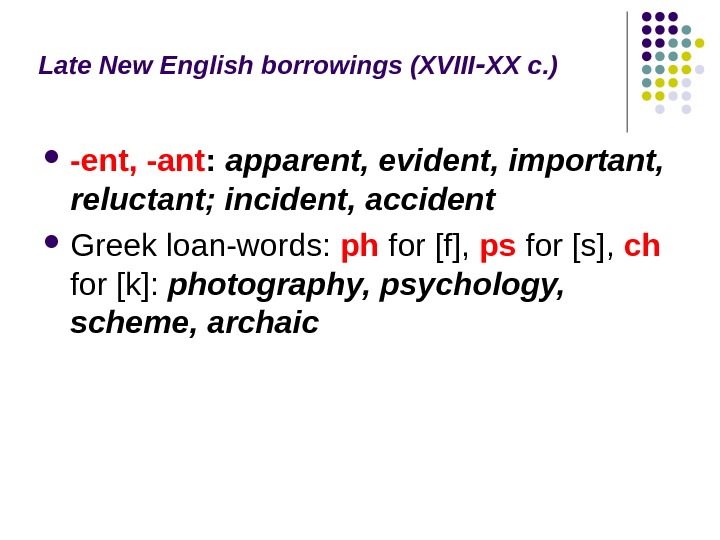
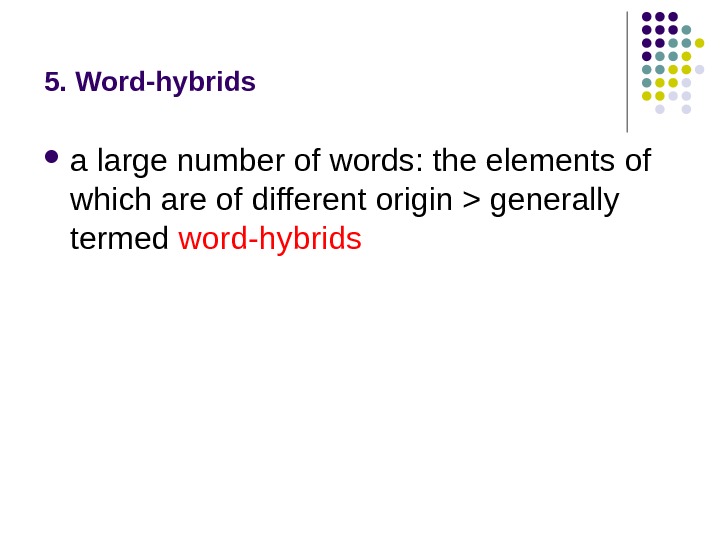
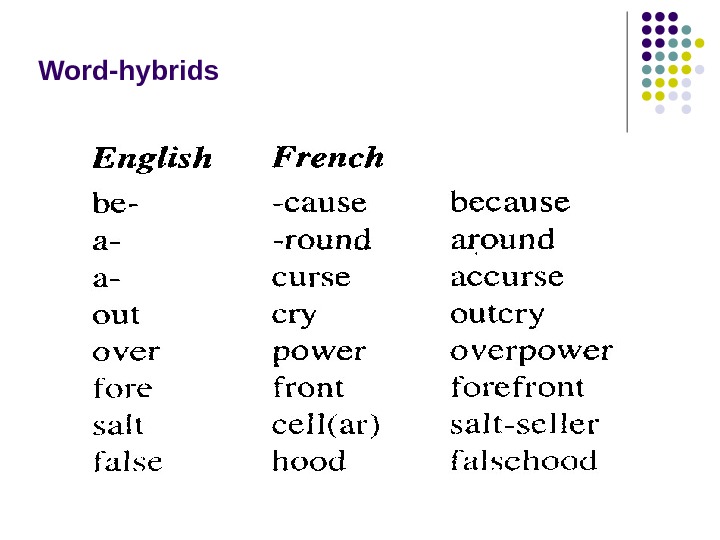
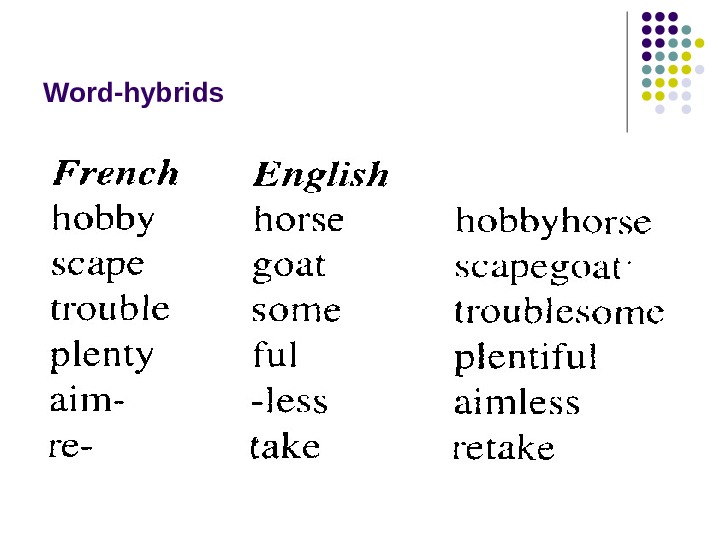
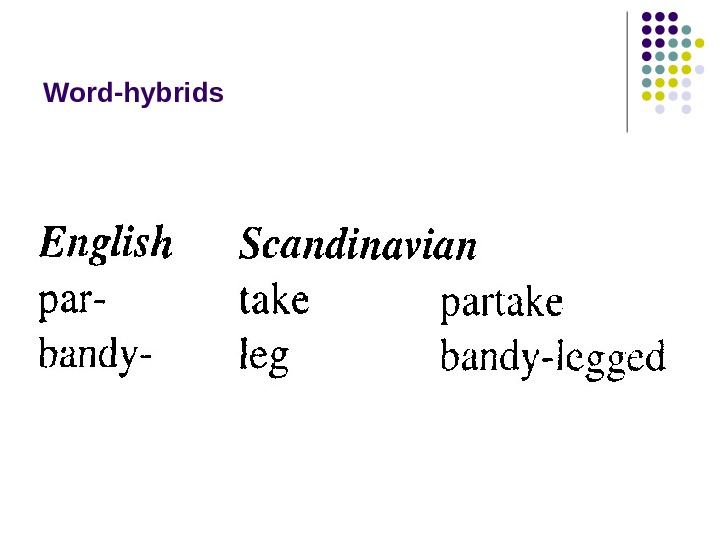
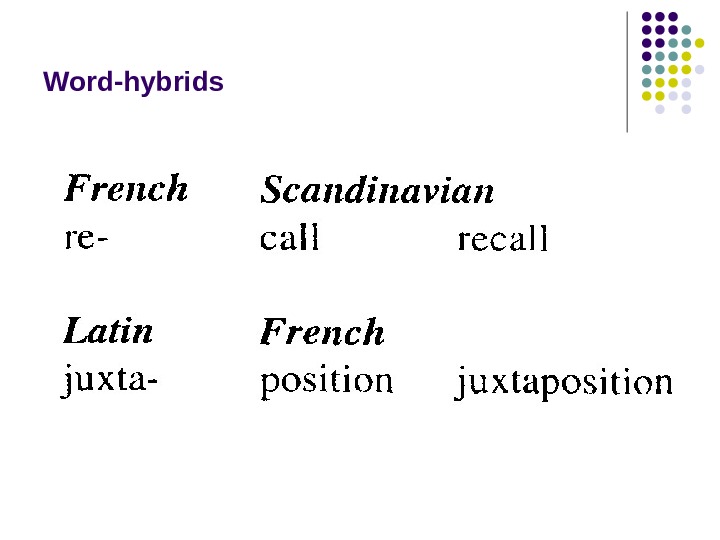
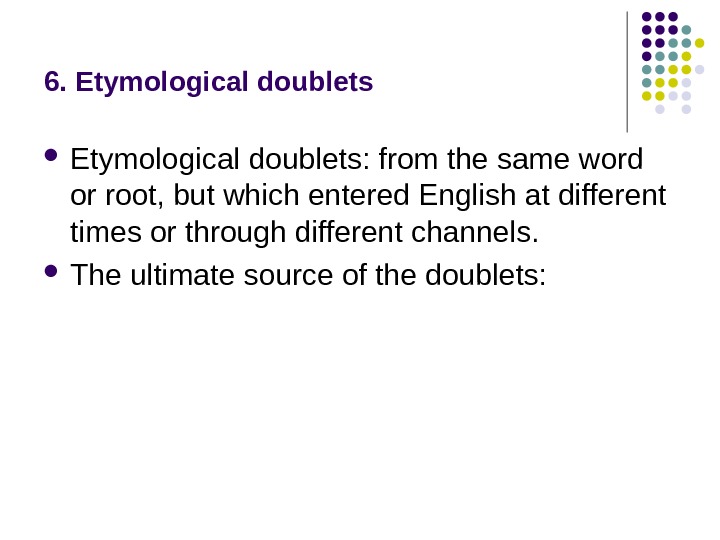
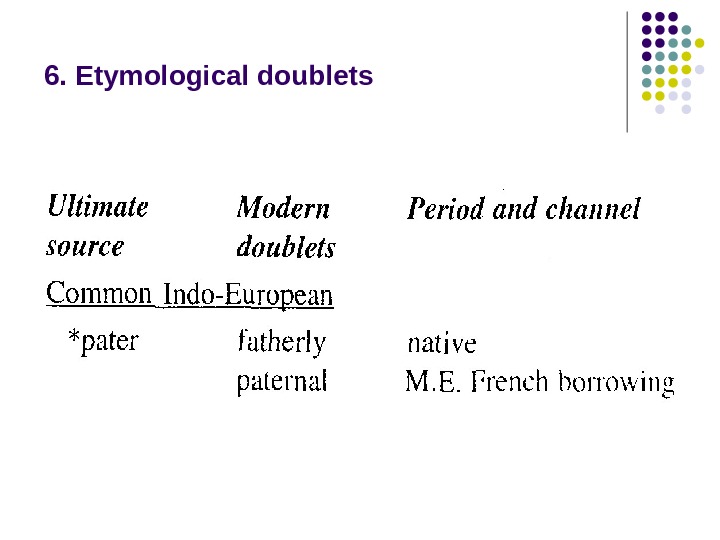
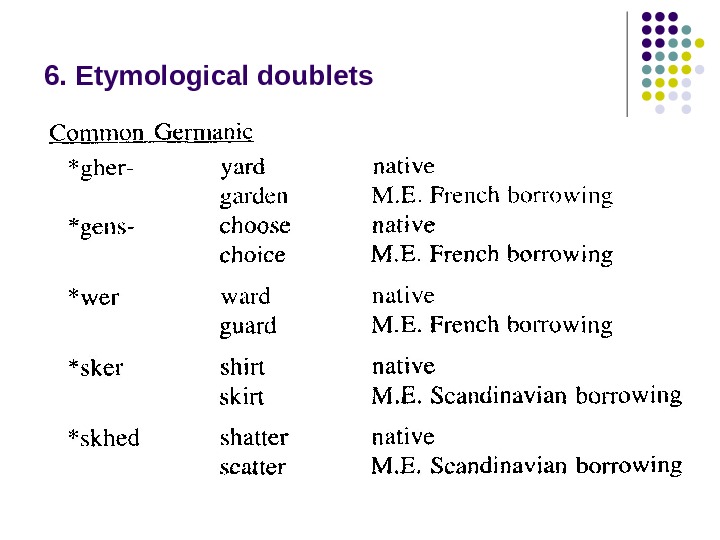
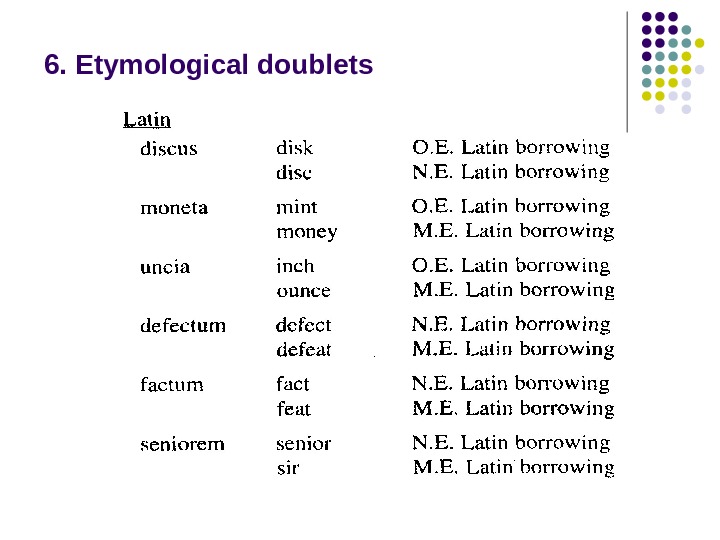
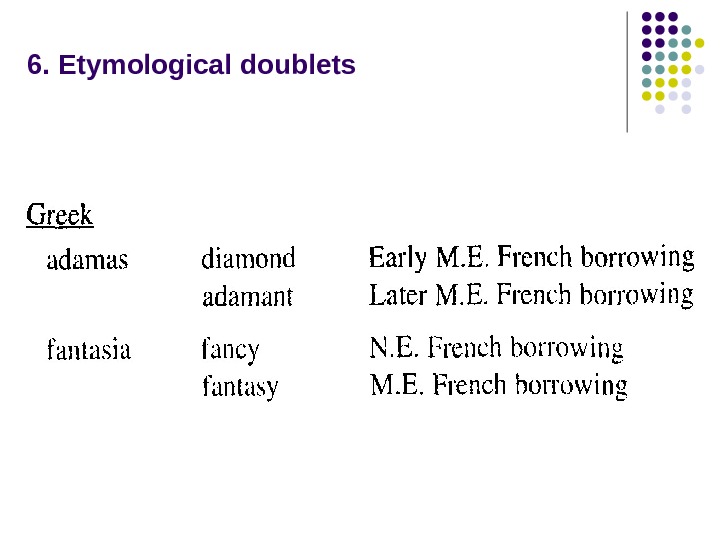
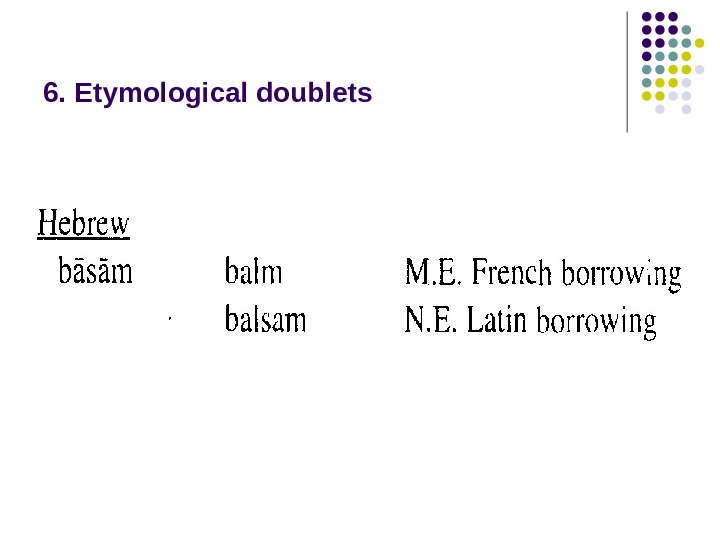
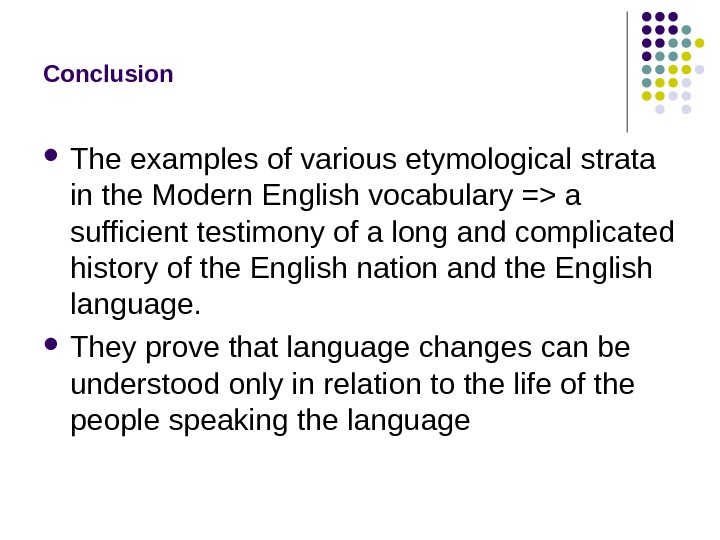

- Размер: 1.5 Mегабайта
- Количество слайдов: 84
Описание презентации Lecture_2_7 DEVELOPMENT OF ENGLISH VOCABULARY FROM the 12 по слайдам
 Lecture_2_7 DEVELOPMENT OF ENGLISH VOCABULARY FROM the 12 th to 19 th c.
Lecture_2_7 DEVELOPMENT OF ENGLISH VOCABULARY FROM the 12 th to 19 th c.
 List of Principal Questions 1. General characteristics 2. Native element in Modern English 2. 1. Common Indo-European stratum 2. 2. Common Germanic stratum 3. Means of enriching vocabulary in Middle English 3. 1. Internal means of enriching vocabulary 3. 2. External means of enriching vocabulary 4. New English 4. 1. General Characteristics 4. 2. Means of enriching vocabulary in New English 4. 2. 1. Internal means of enriching vocabulary 4. 2. 2. External means of enriching vocabulary 5. Word-hybrids 6. Etymological doublets
List of Principal Questions 1. General characteristics 2. Native element in Modern English 2. 1. Common Indo-European stratum 2. 2. Common Germanic stratum 3. Means of enriching vocabulary in Middle English 3. 1. Internal means of enriching vocabulary 3. 2. External means of enriching vocabulary 4. New English 4. 1. General Characteristics 4. 2. Means of enriching vocabulary in New English 4. 2. 1. Internal means of enriching vocabulary 4. 2. 2. External means of enriching vocabulary 5. Word-hybrids 6. Etymological doublets
 1. General characteristics The English vocabulary of today reflects as no other aspect of the language the many changes in the history of the people and various contacts which the English speakers had with many nations and countries. Changes in the vocabulary: losses of words or their meanings, replacements and additions
1. General characteristics The English vocabulary of today reflects as no other aspect of the language the many changes in the history of the people and various contacts which the English speakers had with many nations and countries. Changes in the vocabulary: losses of words or their meanings, replacements and additions
 Lexical changes Losses were connected with events in external history: with the changing conditions of life and the obsolescence of many medieval concepts and customs: OE witena emōt ӡ ‘assembly of the elders’ ceased to exist under the Norman rule)
Lexical changes Losses were connected with events in external history: with the changing conditions of life and the obsolescence of many medieval concepts and customs: OE witena emōt ӡ ‘assembly of the elders’ ceased to exist under the Norman rule)
 Lexical changes 80 — 85% of the OE words went out of use in the succeeding periods. Most of these words were not simply lost; they were replaced by other words of the same or similar meanings. Replacement ME callen, NE call; OE niman > ME taken , NE take; OE pronouns hie and hēo > they and she ; OE weorðan > become ; NE river < OE ea ; NE table < OE bord
Lexical changes 80 — 85% of the OE words went out of use in the succeeding periods. Most of these words were not simply lost; they were replaced by other words of the same or similar meanings. Replacement ME callen, NE call; OE niman > ME taken , NE take; OE pronouns hie and hēo > they and she ; OE weorðan > become ; NE river < OE ea ; NE table < OE bord
 Lexical changes Additions embrace a large number of vocabulary changes — the process of obsolescence and decay. Additions: pure innovations = entirely new words which did not take the place of any other items but were created to name new things, new ideas and new qualities ME citee ‘ town with a cathedral’, duke, duchesse, prynce ‑ new ranks and titles; NE bourgeois, potato, nylon.
Lexical changes Additions embrace a large number of vocabulary changes — the process of obsolescence and decay. Additions: pure innovations = entirely new words which did not take the place of any other items but were created to name new things, new ideas and new qualities ME citee ‘ town with a cathedral’, duke, duchesse, prynce ‑ new ranks and titles; NE bourgeois, potato, nylon.
 Native Words and Borrowings large number of foreign words in English ≠ the vocabulary has lost its Germanic nature. functional role of the native element: the notions expressed by native words, their regularity and frequency of occurrence > Germanic element still holds a fundamental place, and the English vocabulary should be called Germanic.
Native Words and Borrowings large number of foreign words in English ≠ the vocabulary has lost its Germanic nature. functional role of the native element: the notions expressed by native words, their regularity and frequency of occurrence > Germanic element still holds a fundamental place, and the English vocabulary should be called Germanic.
 2. Native element in Modern English native words form two ethymological strata: the Common Indo-European stratum and the Common Germanic stratum.
2. Native element in Modern English native words form two ethymological strata: the Common Indo-European stratum and the Common Germanic stratum.
 2. 1. Common Indo-European stratum the oldest in the vocabulary existed thousands of years B. C. , at the time when it was yet impossible to speak about separate Indo-European languages Common Indo-European vocabulary has been inherited by many modem Indo-European languages, not only Germanic This is often a possible proof of these words belonging to the Common Indo-European stratum: English Latin Russian Mother mater мать Brother frater брат Night nox(noctem) ночь Be fieri быть stand stare стоять Two duo два Three tres три ten decern десять
2. 1. Common Indo-European stratum the oldest in the vocabulary existed thousands of years B. C. , at the time when it was yet impossible to speak about separate Indo-European languages Common Indo-European vocabulary has been inherited by many modem Indo-European languages, not only Germanic This is often a possible proof of these words belonging to the Common Indo-European stratum: English Latin Russian Mother mater мать Brother frater брат Night nox(noctem) ночь Be fieri быть stand stare стоять Two duo два Three tres три ten decern десять
 2. 2. Common Germanic stratum words inherited from Common Germanic (exist before it began splitting into various subgroups around the 1 st century B. C. – 1 st century A. D). These words can be found in various Germanic languages, but not in Indo-European languages other than Germanic. English German Swedish Man man Earth erde jord Harm harm Green griin gron Grey grau gra
2. 2. Common Germanic stratum words inherited from Common Germanic (exist before it began splitting into various subgroups around the 1 st century B. C. – 1 st century A. D). These words can be found in various Germanic languages, but not in Indo-European languages other than Germanic. English German Swedish Man man Earth erde jord Harm harm Green griin gron Grey grau gra
 3. Means of enriching vocabulary in Middle English 3. 1. Internal means of enriching vocabulary Word formation fell into two types: word derivation and word composition Suffixation has always been the most productive way of deriving new words most of the OE productive suffixes have survived many new suffixes have been added from internal and external sources
3. Means of enriching vocabulary in Middle English 3. 1. Internal means of enriching vocabulary Word formation fell into two types: word derivation and word composition Suffixation has always been the most productive way of deriving new words most of the OE productive suffixes have survived many new suffixes have been added from internal and external sources
 Suffixation: Native Suffixes OE — ere > -er from various stems (native + foreign > hybrids) ME partener, fermer, villager Londoner, Southerne; knocker, roller; boiler ‘one who boils’ in the 16 th с. and a ‘vessel for boiling’ in the 19 th с. ; NE: follower, flyer, hearer, listener, teacher, speaker (from native stems); admirer, entertainer, producer (from foreign stems). Its new meaning: rectifier, revolver, type-writer. The suffix -er had several rivals among synonymous borrowed affixes -or, -ist, -ite , but it surpassed them all in productivity
Suffixation: Native Suffixes OE — ere > -er from various stems (native + foreign > hybrids) ME partener, fermer, villager Londoner, Southerne; knocker, roller; boiler ‘one who boils’ in the 16 th с. and a ‘vessel for boiling’ in the 19 th с. ; NE: follower, flyer, hearer, listener, teacher, speaker (from native stems); admirer, entertainer, producer (from foreign stems). Its new meaning: rectifier, revolver, type-writer. The suffix -er had several rivals among synonymous borrowed affixes -or, -ist, -ite , but it surpassed them all in productivity
 Suffixation: Native Suffixes productive suffixes -ness and -ing The suffix -ness was equally productive in all historical periods: alertness, consciousness, politeness (borrowed stems). highly productive suffix of abstract nouns — ME –ing : ME beginning, feeling, spelling, preeching , NE shopping
Suffixation: Native Suffixes productive suffixes -ness and -ing The suffix -ness was equally productive in all historical periods: alertness, consciousness, politeness (borrowed stems). highly productive suffix of abstract nouns — ME –ing : ME beginning, feeling, spelling, preeching , NE shopping
 Suffixation: Native Suffixes -dom , — ship and -hood in all historical periods: ME sheriffdom, dukedom , NE boydom, churchdom ; ME brotherhood, manhood , NE bookhood, inval-idhood ; ME hardship, courtship , NE editorship, relationship A new suffix -man highly productive some words with -man have the connecting element -s ‑ kinsman, statesman
Suffixation: Native Suffixes -dom , — ship and -hood in all historical periods: ME sheriffdom, dukedom , NE boydom, churchdom ; ME brotherhood, manhood , NE bookhood, inval-idhood ; ME hardship, courtship , NE editorship, relationship A new suffix -man highly productive some words with -man have the connecting element -s ‑ kinsman, statesman
 Suffixation: Native Suffixes OE -isc , ME -ish OE En lisc, cildiscӡ (NE childish ), ME sleepish, foolish ; NE bookish, modish, feverish (the last two examples illustrate its use with foreign stems), ME and NE reddish, greenish OE — i ӡ , ME — y : ME fiery, sleepy, faulty , NE hairy, risky, faulty and risky have Romance stems. OE –lic > ME and NE -ly < from a root-morpheme: ME fatherly, manly, masterly, beestly , Early NE neighbourly, lonely, cowardly.
Suffixation: Native Suffixes OE -isc , ME -ish OE En lisc, cildiscӡ (NE childish ), ME sleepish, foolish ; NE bookish, modish, feverish (the last two examples illustrate its use with foreign stems), ME and NE reddish, greenish OE — i ӡ , ME — y : ME fiery, sleepy, faulty , NE hairy, risky, faulty and risky have Romance stems. OE –lic > ME and NE -ly < from a root-morpheme: ME fatherly, manly, masterly, beestly , Early NE neighbourly, lonely, cowardly.
 Suffixation: Native Suffixes ME -less the most productive suffixes: ME helpless, sleepless , NE heartless, fearless (native stems); ME colourless, joyless , NE motionless, powerless (borrowed stems). OE and ME -ful suffix as early as ME: ME harmful, wilful , NE hopeful, wishful (with native stems); beautiful, joyful, lawful, respectful (with borrowed stems ‑ French, Scandinavian and Latin). Verb suffixes of native origin: never productive in English. In ME one native suffix -en to derive verbs from monosyllabic adjectives, mainly native: gladden, lighten, weaken ; sometimes it is applied to noun-stems (derived from adjectives in Early OE with the help of -þ) : strong – strengthen ‑.
Suffixation: Native Suffixes ME -less the most productive suffixes: ME helpless, sleepless , NE heartless, fearless (native stems); ME colourless, joyless , NE motionless, powerless (borrowed stems). OE and ME -ful suffix as early as ME: ME harmful, wilful , NE hopeful, wishful (with native stems); beautiful, joyful, lawful, respectful (with borrowed stems ‑ French, Scandinavian and Latin). Verb suffixes of native origin: never productive in English. In ME one native suffix -en to derive verbs from monosyllabic adjectives, mainly native: gladden, lighten, weaken ; sometimes it is applied to noun-stems (derived from adjectives in Early OE with the help of -þ) : strong – strengthen ‑.
 Suffixation: Borrowed Suffixes > an important place in English word derivation. Borrowed suffixes entered the English language with the two biggest waves of loan-words: French loans in ME and classical loans in Early N
Suffixation: Borrowed Suffixes > an important place in English word derivation. Borrowed suffixes entered the English language with the two biggest waves of loan-words: French loans in ME and classical loans in Early N
 French borrowed suffixes – able : acceptable, admirable, endurable, presentable (with borrowed stems), breakable, shakable (with native English stems ‑ break, shake ). -ess : ME authoress, princess, captainess ‑ with borrowed stems, goddess, huntress ‑ with native stems; NE governess, butleress, priestess. — ее : ME grantee , NE employee, addressee (also with native stems: trustee ) -or: (≈ native suffix –er): collector, educator + a secondary meaning of ‘instrument’: refrigerator, compressor
French borrowed suffixes – able : acceptable, admirable, endurable, presentable (with borrowed stems), breakable, shakable (with native English stems ‑ break, shake ). -ess : ME authoress, princess, captainess ‑ with borrowed stems, goddess, huntress ‑ with native stems; NE governess, butleress, priestess. — ее : ME grantee , NE employee, addressee (also with native stems: trustee ) -or: (≈ native suffix –er): collector, educator + a secondary meaning of ‘instrument’: refrigerator, compressor
 French borrowed suffixes Early NE -ist, -ite : columnist, capitalist, structuralist (also Darwinist from the name of Darwin); Muscovite, Ibsenite — ance or — ence , -ty, -age, -ry, -ment + Franco-Latin — tion / -sion + Latin or Greek — ism : avoid-ance , and hindr-ance (a hybrid with a native stem), peerage, leekage and stowage (with the native stem stow ). NE formations with borrowed suffixes are: forbearance, shortage, goosery, sophistry (Gr), readability, fulfilment, starvation, Darwinism.
French borrowed suffixes Early NE -ist, -ite : columnist, capitalist, structuralist (also Darwinist from the name of Darwin); Muscovite, Ibsenite — ance or — ence , -ty, -age, -ry, -ment + Franco-Latin — tion / -sion + Latin or Greek — ism : avoid-ance , and hindr-ance (a hybrid with a native stem), peerage, leekage and stowage (with the native stem stow ). NE formations with borrowed suffixes are: forbearance, shortage, goosery, sophistry (Gr), readability, fulfilment, starvation, Darwinism.
 French borrowed suffixes – able / -ible (≠ adjective able ‘able to act or be acted upon. Cf. capable, drinkable, eatable. -ous ‘abounding in‘ : dubious, ferocious, tremendous, lustrous, thunderous, righteous -al and -ic (+ -ive ): economical, atomic, defective
French borrowed suffixes – able / -ible (≠ adjective able ‘able to act or be acted upon. Cf. capable, drinkable, eatable. -ous ‘abounding in‘ : dubious, ferocious, tremendous, lustrous, thunderous, righteous -al and -ic (+ -ive ): economical, atomic, defective
 French borrowed suffixes -ise and –fy (highly productive) : memorise, militarise, normalise , but womanise (native stem); -fy ‑ classify, intensify. Borrowed affiexes entered the system of English word-building; some of them are as productive as native affixes Semantically and stylistically most borrowed affixes belong to the language of science, literature, politics, philosophy creation of new terms with these affixes is based on borrowed roots. high frequency of the affixes = sufficient proof of their complete assimilation and productivity
French borrowed suffixes -ise and –fy (highly productive) : memorise, militarise, normalise , but womanise (native stem); -fy ‑ classify, intensify. Borrowed affiexes entered the system of English word-building; some of them are as productive as native affixes Semantically and stylistically most borrowed affixes belong to the language of science, literature, politics, philosophy creation of new terms with these affixes is based on borrowed roots. high frequency of the affixes = sufficient proof of their complete assimilation and productivity
 Prefixation. Native Prefixes Many OE verb prefixes dropped out of use, e. g. a-, to-, on-, of-, ӡ е -, or-. In some words the prefix fused with the root and the structure of the word was simplified, e. g. : (on-, be-) begin, (to-) break.
Prefixation. Native Prefixes Many OE verb prefixes dropped out of use, e. g. a-, to-, on-, of-, ӡ е -, or-. In some words the prefix fused with the root and the structure of the word was simplified, e. g. : (on-, be-) begin, (to-) break.
 Prefixation. Native Prefixes The negative prefixes mis- and un- > a great number of new words: NE misjudge, mispronounce, mislead, unscale, unreal, unfamiliar , etc. ME ut- > out : outlook, outspoken ; ME outcast , NE outbalance ; ME ofer > over- : ME overgrowe(n) , NE overload, overlook ; ME overcaste(n), overtaken , NE overdress, overestimate, overpay ; ME under > under-: ME underwrite(n) , NE underfeed, undermine
Prefixation. Native Prefixes The negative prefixes mis- and un- > a great number of new words: NE misjudge, mispronounce, mislead, unscale, unreal, unfamiliar , etc. ME ut- > out : outlook, outspoken ; ME outcast , NE outbalance ; ME ofer > over- : ME overgrowe(n) , NE overload, overlook ; ME overcaste(n), overtaken , NE overdress, overestimate, overpay ; ME under > under-: ME underwrite(n) , NE underfeed, undermine
 Borrowed Prefixes com- , sub- and re- : re-act, re-adjust, re-fill, re-construct, re-open, re-attack, re-awake de- and dis- : disconnect, disroot (borrowed stems), disbelieve, dislike, disown. en- / in- : enablen, enclosen , NE encamp, endanger, enlist, enrich (with borrowed stems). hybrids with native stems: NE em body, en twine, en trust
Borrowed Prefixes com- , sub- and re- : re-act, re-adjust, re-fill, re-construct, re-open, re-attack, re-awake de- and dis- : disconnect, disroot (borrowed stems), disbelieve, dislike, disown. en- / in- : enablen, enclosen , NE encamp, endanger, enlist, enrich (with borrowed stems). hybrids with native stems: NE em body, en twine, en trust
 Borrowed Prefixes in- (and its variants in- / im- / il- / ir- ) = negative meaning (+ native mis-, un- , borrowed non- ) > numerous synonyms: unpleasant, displeasant; unpossible, impossible; disable, unable, non-able; unfirm, infirm, NE disbelief misbelief, ‑ inhuman non-human ‑ ) non- ( Franco-Latin origin) > highly productive: NE non-attendance, non-Germanic, non-aggression, non-existent ,
Borrowed Prefixes in- (and its variants in- / im- / il- / ir- ) = negative meaning (+ native mis-, un- , borrowed non- ) > numerous synonyms: unpleasant, displeasant; unpossible, impossible; disable, unable, non-able; unfirm, infirm, NE disbelief misbelief, ‑ inhuman non-human ‑ ) non- ( Franco-Latin origin) > highly productive: NE non-attendance, non-Germanic, non-aggression, non-existent ,
 Borrowed Prefixes affixes of the international layer, mostly used with stems of Latin and Greek origin: anti- (Gr) ‑ anti-aircraft, anti climax; ‑ со — (L) ‑ co-exist, co-operate, co-ordinate; ex- (L) ‑ ex-champion, ex-president; extra- (L) ‑ extra-mural, extra-ordinary ; post- (L) ‑ post-position, post-war; pre- (L) ‑ pre-classical, pre- writ ten ( In this list only writ ‑ is a native English root) ; semi- (L) ‑ semi-circle, semi-official.
Borrowed Prefixes affixes of the international layer, mostly used with stems of Latin and Greek origin: anti- (Gr) ‑ anti-aircraft, anti climax; ‑ со — (L) ‑ co-exist, co-operate, co-ordinate; ex- (L) ‑ ex-champion, ex-president; extra- (L) ‑ extra-mural, extra-ordinary ; post- (L) ‑ post-position, post-war; pre- (L) ‑ pre-classical, pre- writ ten ( In this list only writ ‑ is a native English root) ; semi- (L) ‑ semi-circle, semi-official.
 3. 2. External means of enriching vocabulary The principal means of enriching vocabulary in ME are not internal, but external – borrowings. Two languages in succession enriched the vocabulary of English – the Scandinavian language and the French language Nature of the borrowings and their amount < contacts between the English and these languages
3. 2. External means of enriching vocabulary The principal means of enriching vocabulary in ME are not internal, but external – borrowings. Two languages in succession enriched the vocabulary of English – the Scandinavian language and the French language Nature of the borrowings and their amount < contacts between the English and these languages
 Scandinavian borrowings Words of Scandinavian > the 8 th — the 10 th centuries many changes in different spheres of the English language: wordstock, grammar and phonetics. The relative ease < circumstances of the Anglo-Scandinavian contacts
Scandinavian borrowings Words of Scandinavian > the 8 th — the 10 th centuries many changes in different spheres of the English language: wordstock, grammar and phonetics. The relative ease < circumstances of the Anglo-Scandinavian contacts
 Scandinavian borrowings Nouns: law, fellow, sky, skirt, skill, skin, egg, anger, awe, bloom, knife, root, . bull, cake, husband, leg, wing, guest, loan, race, bag, band, brink, bulk, crook, dirt, gap, gate, raft, score, scrap, seat, skim, skull, window, wing Adjectives: big, weak, wrong, ugly, twin, awkward, flat, happy, ill, loose, low, odd, rotten, scares, sly, tight
Scandinavian borrowings Nouns: law, fellow, sky, skirt, skill, skin, egg, anger, awe, bloom, knife, root, . bull, cake, husband, leg, wing, guest, loan, race, bag, band, brink, bulk, crook, dirt, gap, gate, raft, score, scrap, seat, skim, skull, window, wing Adjectives: big, weak, wrong, ugly, twin, awkward, flat, happy, ill, loose, low, odd, rotten, scares, sly, tight
 Scandinavian borrowings Verbs: call, cast, take, happen, scare, hail, want, bask, gape, give, get, forgive, forget, kindle, bait, crawl, cut, die, gasp, hit, lift, raise, rid, scatter, snub, thrive, thrust Pronouns: they, them, their, then. Other form-words borrowed from Scandinavian are: both, though, fro (= native from > to and fro ).
Scandinavian borrowings Verbs: call, cast, take, happen, scare, hail, want, bask, gape, give, get, forgive, forget, kindle, bait, crawl, cut, die, gasp, hit, lift, raise, rid, scatter, snub, thrive, thrust Pronouns: they, them, their, then. Other form-words borrowed from Scandinavian are: both, though, fro (= native from > to and fro ).
 The conditions and the consequences of borrowings 1. a borrowed word had no synonym (addition): law, fellow. 2. The E. synonym was ousted by the borrowing (replacement): Sc. taken (to take) and callen (to call) E. synonyms niman and clypian
The conditions and the consequences of borrowings 1. a borrowed word had no synonym (addition): law, fellow. 2. The E. synonym was ousted by the borrowing (replacement): Sc. taken (to take) and callen (to call) E. synonyms niman and clypian
 The conditions and the consequences of borrowings 3. Both the words (E. and Sc. Preserved > different in meaning: Native Scandinavian borrowing heaven sky starve die
The conditions and the consequences of borrowings 3. Both the words (E. and Sc. Preserved > different in meaning: Native Scandinavian borrowing heaven sky starve die
 The conditions and the consequences of borrowings Phonetic / spelling features of Sc. words: — words with sk / sc in the spelling: sky, skin, skill, scare, score, scald, busk, bask (but not some Old French borrowings as task, scare, scan, scape ) — words with the sound [ g ] or [ k ] before front vowels [ i ], [ e ] [ ei ], in the spelling i, e, ue, ai, a (open syllable) or at the end of the word: give, get, forgive, forget, again, gate, game, keg, kid, kilt, egg, drag, dregs, flag, hug, leg, log, rig personal names ending in -son : Jeffer son , John son or place names ending in -ly, -thorp, -toft (originally meaning «village», «hamlet»): Whit ly , Al thorp , Lowes toft. Mainly in the north-east of England < the Scandinavian influence was stronger
The conditions and the consequences of borrowings Phonetic / spelling features of Sc. words: — words with sk / sc in the spelling: sky, skin, skill, scare, score, scald, busk, bask (but not some Old French borrowings as task, scare, scan, scape ) — words with the sound [ g ] or [ k ] before front vowels [ i ], [ e ] [ ei ], in the spelling i, e, ue, ai, a (open syllable) or at the end of the word: give, get, forgive, forget, again, gate, game, keg, kid, kilt, egg, drag, dregs, flag, hug, leg, log, rig personal names ending in -son : Jeffer son , John son or place names ending in -ly, -thorp, -toft (originally meaning «village», «hamlet»): Whit ly , Al thorp , Lowes toft. Mainly in the north-east of England < the Scandinavian influence was stronger
 The conditions and the consequences of borrowings 4. a borrowed word an English word = etymological doublets (words originating from the same source in Common Germanic) Native Scandinavian borrowing shirt skirt shatter scatter raise rear
The conditions and the consequences of borrowings 4. a borrowed word an English word = etymological doublets (words originating from the same source in Common Germanic) Native Scandinavian borrowing shirt skirt shatter scatter raise rear
 The conditions and the consequences of borrowings 5. an English word = Scandinavian in meaning but slightly different phonetically Sc. phonetic form > in E. : Mod. E to give, to get modern meaning
The conditions and the consequences of borrowings 5. an English word = Scandinavian in meaning but slightly different phonetically Sc. phonetic form > in E. : Mod. E to give, to get modern meaning
 French borrowings The French element in E- large and important ME borrowings deep traces in English < words connected with such spheres of social and political activity: French-speaking Normans had occupied for a long time all places of importance. The amount of these ME borrowings ≈ 3, 500.
French borrowings The French element in E- large and important ME borrowings deep traces in English < words connected with such spheres of social and political activity: French-speaking Normans had occupied for a long time all places of importance. The amount of these ME borrowings ≈ 3, 500.
 French borrowings – government and legislature: assembly, authority, chancellor, council, country, crown, court, government, nation, office, parliament, people, power, realm, sovereign, noble, baron, prince, duke, duchess, feudal, manorcount, countess, justice, judge, crime, damage, false, guilt, heir, injury, interest, jury, marriage, money, penalty, poor, poverty, properly, prove, prison, rent, robber, session, traitor, condemn, sentence , etc. (But: lord, lady, king, queen, earl, knight are native );
French borrowings – government and legislature: assembly, authority, chancellor, council, country, crown, court, government, nation, office, parliament, people, power, realm, sovereign, noble, baron, prince, duke, duchess, feudal, manorcount, countess, justice, judge, crime, damage, false, guilt, heir, injury, interest, jury, marriage, money, penalty, poor, poverty, properly, prove, prison, rent, robber, session, traitor, condemn, sentence , etc. (But: lord, lady, king, queen, earl, knight are native );
 French borrowings – military life: army, banner, battle, captain, company, defeat, escape, force, lieutenant, navy, sergeant, siege, soldier, troops, vessel, peace, victory, general, colonel, major , etc. – religion: abbey, altar, archangel, Bible, baptism, cell, chapel, charity, clergy, divine, grace, honour, glory, lesson, miracle, paradise, parish, pray, preach, procession, religion, rule, sacrifice, saint, save, sermon, tempt, virgin, virtue;
French borrowings – military life: army, banner, battle, captain, company, defeat, escape, force, lieutenant, navy, sergeant, siege, soldier, troops, vessel, peace, victory, general, colonel, major , etc. – religion: abbey, altar, archangel, Bible, baptism, cell, chapel, charity, clergy, divine, grace, honour, glory, lesson, miracle, paradise, parish, pray, preach, procession, religion, rule, sacrifice, saint, save, sermon, tempt, virgin, virtue;
 French borrowings ‑ architecture, house and furniture: arch, castle, tower, cellar, chimney, column, couch, curtain, cushion, lamp, mansion, palace, pillar, porch, table, wardrobe, chair (but stool is English) ; ‑ art: art, beauty, colour, design, figure, image, ornament, paint; – city crafts: painter, tailor, carpenter, butcher, draper, grocer (but country occupations remained English: shepherd, miller, shoemaker, smith )
French borrowings ‑ architecture, house and furniture: arch, castle, tower, cellar, chimney, column, couch, curtain, cushion, lamp, mansion, palace, pillar, porch, table, wardrobe, chair (but stool is English) ; ‑ art: art, beauty, colour, design, figure, image, ornament, paint; – city crafts: painter, tailor, carpenter, butcher, draper, grocer (but country occupations remained English: shepherd, miller, shoemaker, smith )
 French borrowings – pleasure and entertainment: joy, delight, ease, comfort, sport, music, art, feast, pleasure, leisure; ‑ meals and dishes: supper, dinner, sauce, boil, fry, roast, toast, soup, sausage, jelly, pork, beef, mutton, veal, bacon, brawn, venison (but the corresponding names of domestic animals remained English. It is often repeated since Walter Scott made it popular in ‘Ivenhoe’, that while the names of several animals taken care of by the lower classes are English pig, ox, cow, calf, sheep, swine, bear, deer , they appear on the table with French names)
French borrowings – pleasure and entertainment: joy, delight, ease, comfort, sport, music, art, feast, pleasure, leisure; ‑ meals and dishes: supper, dinner, sauce, boil, fry, roast, toast, soup, sausage, jelly, pork, beef, mutton, veal, bacon, brawn, venison (but the corresponding names of domestic animals remained English. It is often repeated since Walter Scott made it popular in ‘Ivenhoe’, that while the names of several animals taken care of by the lower classes are English pig, ox, cow, calf, sheep, swine, bear, deer , they appear on the table with French names)
 French borrowings ‑ fashion, garment: apparel, boot, coat, collar, costume, dress, fur, garment, gown, jewel, robe; – words of everyday life: air, place, river, large, age, boil, branch, brush, catch, chain, chair, table, choice, cry, cost; ‑ forms of address: sir, madam, mister, mistress, master, servant; – relationship: aunt, uncle, nephew, cousin
French borrowings ‑ fashion, garment: apparel, boot, coat, collar, costume, dress, fur, garment, gown, jewel, robe; – words of everyday life: air, place, river, large, age, boil, branch, brush, catch, chain, chair, table, choice, cry, cost; ‑ forms of address: sir, madam, mister, mistress, master, servant; – relationship: aunt, uncle, nephew, cousin
 French borrowings ‑ miscellaneous: advice, air, allow, anxious, boil, carry, change, clos, cover, deceive, doble, eager, enjoy, ente, envy, excuse, face, firm, flower, honest, hour, joy, large, letter, manner, move, necessary, nice, noise, obey, occupy, pale, pass, please, previous, push, river, remember, satisfy, search, scissors, single, sudden, sure, travel, treasure, very, use
French borrowings ‑ miscellaneous: advice, air, allow, anxious, boil, carry, change, clos, cover, deceive, doble, eager, enjoy, ente, envy, excuse, face, firm, flower, honest, hour, joy, large, letter, manner, move, necessary, nice, noise, obey, occupy, pale, pass, please, previous, push, river, remember, satisfy, search, scissors, single, sudden, sure, travel, treasure, very, use
 The place of the French borrowings 1. denote notions unknown to the English up to the time: government, parliament, general, colonel 2. The English synonym is ousted by the French borrowing: English French micel large here army ea river
The place of the French borrowings 1. denote notions unknown to the English up to the time: government, parliament, general, colonel 2. The English synonym is ousted by the French borrowing: English French micel large here army ea river
 The place of the French borrowings 3. Both the words are preserved, but they are stylistically different: English French to begin to commence to work to labour to leave to abandon freedom liberty brotherhood fraternity life existence look regard ship vessel hearty welcome cordial reception French borrowing = more literary or even bookish English word = common; (but: foe ( native , English) ‑ enemy (French borrowing)
The place of the French borrowings 3. Both the words are preserved, but they are stylistically different: English French to begin to commence to work to labour to leave to abandon freedom liberty brotherhood fraternity life existence look regard ship vessel hearty welcome cordial reception French borrowing = more literary or even bookish English word = common; (but: foe ( native , English) ‑ enemy (French borrowing)
 The place of the French borrowings 4. many words were borrowed with the same word-building affix > became clear to the English-speaking people > entered the system of word-building means > word-hybrids: -ment ( government, parliament, agreement ) > English-French hybrids: fulfilment, amazement. -ance/-ence ( innocence, ignorance, repentance ) > word-hybrids: hindrance French borrowings admirable, tolerable, reasonable — readable, eatable, unbearable.
The place of the French borrowings 4. many words were borrowed with the same word-building affix > became clear to the English-speaking people > entered the system of word-building means > word-hybrids: -ment ( government, parliament, agreement ) > English-French hybrids: fulfilment, amazement. -ance/-ence ( innocence, ignorance, repentance ) > word-hybrids: hindrance French borrowings admirable, tolerable, reasonable — readable, eatable, unbearable.
 The place of the French borrowings 5. borrowings from French → ethymological doublets – from the Common Indo-European: native borrowed fatherly paternal – from the Common Germanic: Native borrowed yard garden ward guard choose choice – from Latin: Earlier Later (Old English) (Middle English) borrowing Mint money inch ounce
The place of the French borrowings 5. borrowings from French → ethymological doublets – from the Common Indo-European: native borrowed fatherly paternal – from the Common Germanic: Native borrowed yard garden ward guard choose choice – from Latin: Earlier Later (Old English) (Middle English) borrowing Mint money inch ounce
 The place of the French borrowings 6. great number of French borrowings > families of words: similar in meaning — different in origin: native borrowed mouth oral sun solar see vision
The place of the French borrowings 6. great number of French borrowings > families of words: similar in meaning — different in origin: native borrowed mouth oral sun solar see vision
 The place of the French borrowings 7. There are calques on the French phrase: It’s no doubt – Se n’est pas doute Without doubt – Sans doute Out of doubt – Hors de doute.
The place of the French borrowings 7. There are calques on the French phrase: It’s no doubt – Se n’est pas doute Without doubt – Sans doute Out of doubt – Hors de doute.
 4. New English 4. 1. General Characteristics The language in NE is growing very rapidly, the amount of new words exceeds the number of obsolete ones manifold. Both internal means and external means are used for the purpose of enriching the vocabulary
4. New English 4. 1. General Characteristics The language in NE is growing very rapidly, the amount of new words exceeds the number of obsolete ones manifold. Both internal means and external means are used for the purpose of enriching the vocabulary
 4. 2. Means of enriching vocabulary in New English 4. 2. 1. Internal means of enriching vocabulary a new, specifically English way of word derivation ‑ conversion (also known as “functional change The word > another part of speech with an identical initial form: book (a noun): book – books book (a verb): book – books – booked – booking The book is on the table. – He booked a room. man (n) – man (v), stone (n) – stone (v) – stone (adj) (as in “ a stone bench ”), etc.
4. 2. Means of enriching vocabulary in New English 4. 2. 1. Internal means of enriching vocabulary a new, specifically English way of word derivation ‑ conversion (also known as “functional change The word > another part of speech with an identical initial form: book (a noun): book – books book (a verb): book – books – booked – booking The book is on the table. – He booked a room. man (n) – man (v), stone (n) – stone (v) – stone (adj) (as in “ a stone bench ”), etc.
 Conversion a large number of E. verbs and nouns identical in form: OE lufu n > Late ME love n – love ( n ) v > NE love n, v Late ME chaunge n (from Fr. ) > NE change n, v. nouns < verbs: Early NE drive n < drive v , paint n < paint v. break < break ; NE look < look
Conversion a large number of E. verbs and nouns identical in form: OE lufu n > Late ME love n – love ( n ) v > NE love n, v Late ME chaunge n (from Fr. ) > NE change n, v. nouns < verbs: Early NE drive n < drive v , paint n < paint v. break < break ; NE look < look
 Conversion A borrowed noun > frequently into a verb: blitz, camouflage, sabotage. Most parts of the body > verbs: We can head a ball, a group of people or a list; we elbow or shoulder our way through a crowd; we can eye a person with dislike or suspicion; children sometimes cheek their elders if they cannot stomach the way in which they are treated. One can nose around, finger some knick-knacks, thumb a book, face a danger, etc.
Conversion A borrowed noun > frequently into a verb: blitz, camouflage, sabotage. Most parts of the body > verbs: We can head a ball, a group of people or a list; we elbow or shoulder our way through a crowd; we can eye a person with dislike or suspicion; children sometimes cheek their elders if they cannot stomach the way in which they are treated. One can nose around, finger some knick-knacks, thumb a book, face a danger, etc.
 Word-Derivation Sound interchanges — never a productive means in E. : instances of sound interchanges few, in NE their role grew. Cf. the resulting vowel interchanges in NE cleanse, ‑ wilderness, wise – wisdom ‑ result of weakening and loss of many suffixes and grammatical endings > sound interchanges the only means of distinction : song sing, tale – tell, full – fill, sit – set ‑.
Word-Derivation Sound interchanges — never a productive means in E. : instances of sound interchanges few, in NE their role grew. Cf. the resulting vowel interchanges in NE cleanse, ‑ wilderness, wise – wisdom ‑ result of weakening and loss of many suffixes and grammatical endings > sound interchanges the only means of distinction : song sing, tale – tell, full – fill, sit – set ‑.
 Word-Derivation The role of stress in word-building < weakening and loss of final syllables → no other differences: Early NE 'contrast n and con'trast v NE 'export ‑ ex'port, 'conduct ‑ con'duct, 'increase in'crease ‑
Word-Derivation The role of stress in word-building < weakening and loss of final syllables → no other differences: Early NE 'contrast n and con'trast v NE 'export ‑ ex'port, 'conduct ‑ con'duct, 'increase in'crease ‑
 4. 2. 2. External means of enriching vocabulary Very many new words in NE < borrowing — sociolinguistic factors into consideration Chronologically NE borrowings: Early New English period – XV–XVII centuries late New English – XVIII–XX centuries
4. 2. 2. External means of enriching vocabulary Very many new words in NE < borrowing — sociolinguistic factors into consideration Chronologically NE borrowings: Early New English period – XV–XVII centuries late New English – XVIII–XX centuries
 Early New English borrowings (XV — XVII centuries) XV c. – the epoch of Renaissance > many words borrowed from the Italian tongue: aria, bass, concerto, duet, finale, solo, sonata, piano, soprano, tenor, cameo, archipelago, dilettante, fresco, violin, balcony, corridor, design, gallery, granite, parquet, pedestal, studio, gondola, grotto, volcano
Early New English borrowings (XV — XVII centuries) XV c. – the epoch of Renaissance > many words borrowed from the Italian tongue: aria, bass, concerto, duet, finale, solo, sonata, piano, soprano, tenor, cameo, archipelago, dilettante, fresco, violin, balcony, corridor, design, gallery, granite, parquet, pedestal, studio, gondola, grotto, volcano
 Early New English borrowings (XV — XVII c. ) in the XVI century – Spanish and Portuguese words: armada, barricade, cannibal, cargo, embargo, escapade; banana, canoe, chocolate, cocao, collibri, maize, negro, potato, ranch, tobacco, tomato, tornado, mosquito, renegade, matador;
Early New English borrowings (XV — XVII c. ) in the XVI century – Spanish and Portuguese words: armada, barricade, cannibal, cargo, embargo, escapade; banana, canoe, chocolate, cocao, collibri, maize, negro, potato, ranch, tobacco, tomato, tornado, mosquito, renegade, matador;
 Early New English borrowings (XV — XVII c. ) Dutch loan-words: pack, scour, spool, stripe, hops, tub, scum, bowline, buoy, cruise, deck, dock, freight, keel, skipper, easel, landscape, sketch
Early New English borrowings (XV — XVII c. ) Dutch loan-words: pack, scour, spool, stripe, hops, tub, scum, bowline, buoy, cruise, deck, dock, freight, keel, skipper, easel, landscape, sketch
 Early New English borrowings (XV — XVII c. ) Latin (the language of culture of the time) : – verbs, with the characteristic endings -ate , -ute : aggravate, abbreviate, exaggerate, frustrate, separate, irritate, contribute, constitute, persecute, prosecute, execute – adjectives ending in -ant, -ent, -ior, -al : arrogant, reluctant, evident, obedient, superior, inferior, senior, junior, dental, cordial, filial.
Early New English borrowings (XV — XVII c. ) Latin (the language of culture of the time) : – verbs, with the characteristic endings -ate , -ute : aggravate, abbreviate, exaggerate, frustrate, separate, irritate, contribute, constitute, persecute, prosecute, execute – adjectives ending in -ant, -ent, -ior, -al : arrogant, reluctant, evident, obedient, superior, inferior, senior, junior, dental, cordial, filial.
 Early New English borrowings (XV — XVII c. ) French and Latin loan-words in E< one and the same root, i. e. they are etymological doublets: sever – separate, royal – regal, sure – secure, defeat – defect, pursue – prosecute, fragile – frail, pauper – poor, hospital – hotel, history – story, example – sample
Early New English borrowings (XV — XVII c. ) French and Latin loan-words in E< one and the same root, i. e. they are etymological doublets: sever – separate, royal – regal, sure – secure, defeat – defect, pursue – prosecute, fragile – frail, pauper – poor, hospital – hotel, history – story, example – sample
 Etymological doublets
Etymological doublets
 Etymological doublets
Etymological doublets
 Early New English borrowings (XV — XVII c. ) XVII c. — relations with the peoples of America : canoe, maize, potato, tomato, tobacco, mahogany, cannibal, hammock, squaw, moccasin, wigwam
Early New English borrowings (XV — XVII c. ) XVII c. — relations with the peoples of America : canoe, maize, potato, tomato, tobacco, mahogany, cannibal, hammock, squaw, moccasin, wigwam
 Early New English borrowings (XV — XVII c. ) French borrowings : aggressor, apartment, brunette, ballet, billet, caprice, coquette, intrigue, fatigue, naïve, campaign, caprice, caress, console, coquette, cravat, billet-doux, carte blanche Later: garage, magazine, policy, machine.
Early New English borrowings (XV — XVII c. ) French borrowings : aggressor, apartment, brunette, ballet, billet, caprice, coquette, intrigue, fatigue, naïve, campaign, caprice, caress, console, coquette, cravat, billet-doux, carte blanche Later: garage, magazine, policy, machine.
 French Borrowings Origin Phonetics of French borrowings always helps to prove their origin These phonetic features: stress and special sound/letter features: Words which do not have stress on the first syllable unless the first syllable is a prefix are almost always French borrowings of the New English period. Words containing the sounds [ ]ʃ spelled not sh, [ʤ ] ‑ not dg , [ ]ʧ not ‑ ch and practically all words with the sound [ ] ӡ = French origin: aviation, social, Asia, soldier, jury, literature, pleasure, treasure
French Borrowings Origin Phonetics of French borrowings always helps to prove their origin These phonetic features: stress and special sound/letter features: Words which do not have stress on the first syllable unless the first syllable is a prefix are almost always French borrowings of the New English period. Words containing the sounds [ ]ʃ spelled not sh, [ʤ ] ‑ not dg , [ ]ʧ not ‑ ch and practically all words with the sound [ ] ӡ = French origin: aviation, social, Asia, soldier, jury, literature, pleasure, treasure
 Late New English borrowings (XVIII XX ‑ centuries) German: cobalt, nickel, zinc, dynamics, kindergarten, halt, stroll, poodle, waltz, wagon, boy, girl, blitz, bunker, fürer, Gestapo, nazi and some translation loans – swan-song, standpoint, environment, superman, world outlook, class struggle, masterpiece
Late New English borrowings (XVIII XX ‑ centuries) German: cobalt, nickel, zinc, dynamics, kindergarten, halt, stroll, poodle, waltz, wagon, boy, girl, blitz, bunker, fürer, Gestapo, nazi and some translation loans – swan-song, standpoint, environment, superman, world outlook, class struggle, masterpiece
 Late New English borrowings (XVIII XX c‑. ) French: attaché, communiqué, dossier, ball, beau, cortege, cafe, coquette, hotel, picnic, restaurant, ballet, ensemble, essay, genre, brigade, corps, maneuver, marine, magazine, machine, garage, police, engine, nacelle, aileron, blouse, chemise, corsage, cravat, champagne, menu, soup, detail, entrance, moustache, progress, ticket
Late New English borrowings (XVIII XX c‑. ) French: attaché, communiqué, dossier, ball, beau, cortege, cafe, coquette, hotel, picnic, restaurant, ballet, ensemble, essay, genre, brigade, corps, maneuver, marine, magazine, machine, garage, police, engine, nacelle, aileron, blouse, chemise, corsage, cravat, champagne, menu, soup, detail, entrance, moustache, progress, ticket
 Late New English borrowings (XVIII XX c. )‑ Hindi (Indian): bungalow, jungle, indigo, shampoo, rajah, coshemere Chinese: coolie, tea Arabic: caravan, divan, alcohol, algebra, coffee, bazaar, orange, cotton, candy, chess, emir, moslem, Koran Australian: kangaroo, boomerang, lubra Czech robot; Polish mazurka, Malayan bamboo, Persian shawl, Japanese rickshaw, Australian boomerang, Polynesian taboo, Congolese zebra
Late New English borrowings (XVIII XX c. )‑ Hindi (Indian): bungalow, jungle, indigo, shampoo, rajah, coshemere Chinese: coolie, tea Arabic: caravan, divan, alcohol, algebra, coffee, bazaar, orange, cotton, candy, chess, emir, moslem, Koran Australian: kangaroo, boomerang, lubra Czech robot; Polish mazurka, Malayan bamboo, Persian shawl, Japanese rickshaw, Australian boomerang, Polynesian taboo, Congolese zebra
 Late New English borrowings (XVIII XX c. )‑ ‑ Russian: Before the October Revolution — Russian realia of the time: borzoi, samovar, tsar, verst, taiga, astrakhan, beluga, boyar, copeck, intelligentsia, muzhik, rouble, trika, verst, vodka After the Revolution — political role of this country in the world: Soviet, bolshevik, kolkhoz, Komsomol. Cultural and technical achievements: sputnik, lunokhod, synchrophasotron, cosmonaut recently political terms: glasnost, perestroika translation loans: collective farm, Five-Year-Plan, wall newspaper, self-criticism. Russian suffix –nik: narodnik, kolkhoznik, udarnik, sputnik, lunnik , ( peacenik ‘active fighter for peace’)
Late New English borrowings (XVIII XX c. )‑ ‑ Russian: Before the October Revolution — Russian realia of the time: borzoi, samovar, tsar, verst, taiga, astrakhan, beluga, boyar, copeck, intelligentsia, muzhik, rouble, trika, verst, vodka After the Revolution — political role of this country in the world: Soviet, bolshevik, kolkhoz, Komsomol. Cultural and technical achievements: sputnik, lunokhod, synchrophasotron, cosmonaut recently political terms: glasnost, perestroika translation loans: collective farm, Five-Year-Plan, wall newspaper, self-criticism. Russian suffix –nik: narodnik, kolkhoznik, udarnik, sputnik, lunnik , ( peacenik ‘active fighter for peace’)
 Late New English borrowings (XVIII XX c. )‑ NE: formed on the basis of Greek and Latin vocabulary: mainly scientific or technical terms: telephone, telegraph, teletype, telefax, microphone, sociology, politology, electricity to identify Latin loan-words of NE: -ate: dominate, locate, separate -ute: execute, prosecute – ct: correct, inspect
Late New English borrowings (XVIII XX c. )‑ NE: formed on the basis of Greek and Latin vocabulary: mainly scientific or technical terms: telephone, telegraph, teletype, telefax, microphone, sociology, politology, electricity to identify Latin loan-words of NE: -ate: dominate, locate, separate -ute: execute, prosecute – ct: correct, inspect
 Late New English borrowings (XVIII XX c. )‑ -ent, -ant : apparent, evident, important, reluctant; incident, accident Greek loan-words: ph for [f], ps for [s], ch for [k]: photography, psychology, scheme, archaic
Late New English borrowings (XVIII XX c. )‑ -ent, -ant : apparent, evident, important, reluctant; incident, accident Greek loan-words: ph for [f], ps for [s], ch for [k]: photography, psychology, scheme, archaic
 5. Word-hybrids a large number of words: the elements of which are of different origin > generally termed word-hybrids
5. Word-hybrids a large number of words: the elements of which are of different origin > generally termed word-hybrids
 Word-hybrids
Word-hybrids
 Word-hybrids
Word-hybrids
 Word-hybrids
Word-hybrids
 Word-hybrids
Word-hybrids
 6. Etymological doublets: from the same word or root, but which entered English at different times or through different channels. The ultimate source of the doublets:
6. Etymological doublets: from the same word or root, but which entered English at different times or through different channels. The ultimate source of the doublets:
 6. Etymological doublets
6. Etymological doublets
 6. Etymological doublets
6. Etymological doublets
 6. Etymological doublets
6. Etymological doublets
 6. Etymological doublets
6. Etymological doublets
 6. Etymological doublets
6. Etymological doublets
 Conclusion The examples of various etymological strata in the Modern English vocabulary => a sufficient testimony of a long and complicated history of the English nation and the English language. They prove that language changes can be understood only in relation to the life of the people speaking the language
Conclusion The examples of various etymological strata in the Modern English vocabulary => a sufficient testimony of a long and complicated history of the English nation and the English language. They prove that language changes can be understood only in relation to the life of the people speaking the language
 Thank you The presentation can be found in the computer laboratory: Мои документы > История английского языка
Thank you The presentation can be found in the computer laboratory: Мои документы > История английского языка

